#literally all of the characters with available routes have family trauma
Explore tagged Tumblr posts
Text
bitches be like "nooo i don't have any family trauma" and then their favorite game is mystic messenger
#you're not fooling anyone sweetie#literally all of the characters with available routes have family trauma#literally. all of them.#mysme#mysmes#jaehee kang#mystic messenger#yoosung kim#mysme 707#707#zen mm#hyun ryu#saeran choi#mysme saeran#choi twins#saeyoung#luciel choi#saeyoung choi#jumin han
732 notes
·
View notes
Text
rhea and identity. part 1: what’s in a name
Alright, because I’m constantly thinking about her and why not! Here’s part one in a series about Rhea and her view of her identity and selfhood: focusing on her name and aliases throughout the years.
spoilers for the entirety of three houses below :)
As a preview part two and three will be on her role as a mother and then her role as a child in the story and psychologically. Both will probably be quite a bit longer than this one as here I’m covering stuff I’ve mostly talked about before, but good to have it in one place with citations, so let’s go!
An interesting tendency I’ve seen in fandom is to place Rhea’s role as Rhea, herself, the archbishop and Rhea as Seiros, the warrior and avenger, as diametrically opposed to one another. This makes a lot of sense as Crimson Flower - the one route where Rhea literally has any agency at all in part two of the game - itself uses this in both story and gameplay. Here when we meet Rhea on the battlefield at Taltean she is in the unique “Saint” class and her dialogue prior to being fought makes it quite clear that she has “become Seiros”.
Field of Revenge
Church soldier: Lady Rhea….
Rhea: Call me Seiros now.
Rhea: I am no longer the archbishop, but rather a warrior.
(later on in the final map Catherine also ends up correcting her speech and referring to her as “Lady Seiros”)
But hm. I wonder what difference in the CF route split led her to take on this persona? Could it have something to do with the fact she has once again come face to face with a human using Agarthan technology to infiltrate / sack her family’s tomb in aid of another who’s literally wielding her mom aka god as a weapon of war?
The one thing fandom overlooks is that from the few scant sources we have in canon Seiros is just as much a falsified identity as the current Rhea is, if not more so. You can see in the official FE3h character design breakdown that there is a note pointing to Seiros’s hair that has been translated as “her hair is dyed, but only the tips show another color” (source post for that here).
It is difficult to see in book scans available but thankfully her Fire Emblem Heroes art makes it even clearer that the light blond we see on Seiros isn’t her true coloring. Compare to the in game Saint model.

(slightly related: back when FEH seiros came out there was some fan pondering on whether nabatean hair darkens as the person gets older and i just think that’s really neat)
All of the references to her in The History of Fódlan and other church doctrine describe her as a saint and messenger of the goddess, but never otherworldly or inhuman. This combined with Rhea’s claim in VW that she “called herself Seiros” seems to make it clear that this was a role she took on after the Red Canyon Massacre had happened, most likely to hide her origin as the one survivor there and protect the other remaining Nabateans of the land from further scrutiny.
I actually think its quite creative that fandom has decided to use Seiros as shorthand for Rhea before she started playing at human, but I also think it is very haunting and deliberate that we do not know Rhea’s real name. Most likely not even Seteth or his brothers know it seeing as Rhea being the one surviving Nabatean from Zanado must mean they all met some time after the Red Canyon Massacre took place and most likely right around when Rhea became Seiros.
The only person who could possibly know Rhea’s true name is Sothis, and I think that’s important. I also think it is important to note that everything we know of the Seiros identity was created due to the trauma of Zanado’s destruction as it is pertinent to understanding why she falls back on it when she interprets events as repeating in Crimson Flower.
#|spoirheas#((im so sad that so much of the work that went into 3hs backstory is seen in like the tiny scrawl of production notes#((curious if the other four saints also took on aliases to protect their identities as nabateans....))#and maybe mentioned once in the nindream interview. but ive dealt with less before!! iwill talk about rhea and will not be stopped!!))#;spoirheas
19 notes
·
View notes
Text
Wonder Egg Priority finale thoughts
My Tumblr has a lot of anti-bully content, so it was probably no surprise when I began to watch and enjoy Wonder Egg Project this past spring. The series famously hit production delays that forced them to put out a mid-series recap episode, and that decision in turn forced them to push the final episode until late June. But now that the series (or at least season 1) is out there and complete, I thought I’d talk about how it all shook out in the end as well as the questions it left me sitting with.
For the uninitiated, here’s a bit of the context: Wonder Egg Project deals with four middle-school teen girls who’ve undergone hardships either at home or at school or both. They all lose someone they care about to tragic suicides, and then they discover the titular wonder eggs. They get these eggs from a vending machine and then, when they fall asleep, they enter a dreamworld where these eggs hatch to reveal a young person who recently committed suicide. For that night, it is the duty of the girl who got that egg to fight and defend that suicide victim from monstrous enemies that represent their abusers and oppressors. The girls are told that if they protect enough of these victims over many nights, they will be able to resurrect the specific person they lost to suicide. But of course, if you get injured or killed in the dreamworld, it affects your body in reality as well.
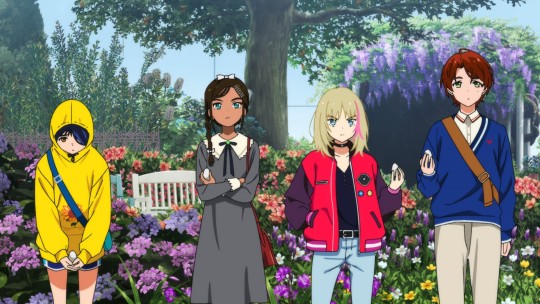
The squad: Ai, Neiru, Rika, and Momoe.
Obviously, bullying is among the topics most frequently explored here, but we also deal with so many other terrible things that people might experience during childhood and adolescence. Physical, verbal, and sexual abuse are all on the table. Coming to terms with one’s gender identity is raised. It’s a show that manages to tackle a lot of heavy subjects through the lens of what’s essentially magical girl combat. I mean, there are no outfit transformations or any of that stuff, but still.
With THAT out of the way, let me talk about how the series wrapped up.
It’s clear to the viewers that there’s a lot that doesn’t make sense during the show — it’s intentionally very trippy and ethereal at times — and there’s also a lot that raises obvious questions even if you grasp it. Where do the eggs and their connection to the recently deceased come from? How do the psychological traumas of the various egg-children manifest as monsters that can literally kill you? What’s the deal with Acca and Ura-Acca and their freaky dummy bodies? What are they getting out of this whole deal with the eggs and the girls? What do the repeated references to the “temptation of death” mean? How does access to the Egg Garden even work? Is it really possible to resurrect their dead friends? Is Mr. Sawaki a predator or a chill guy or what? Why did Neiru’s sister stab her? And so on.
The writers could’ve opted to keep things mysterious and hazy and metaphysical for the entire run or they could’ve provided lots of explanations and tried to ground this weird story in some sort of strange logic, but I’m actually pleased that they opted to go down the middle. There are answers for many things, but not for all. And when those answers come, they typically just raise more questions as well as doubts to their validity.
SPOILERS for the finale/”special episode” below the cut.
So, obviously the answers for Acca and Ura-Acca are centered around Frill. Frill is this interesting fusion between the artificial and the organic; her body can be injured like any regular physical body, but she’s actually an A.I. on the inside. Acca and Ura-Acca are the exact reverse of this — they’re human minds inside of completely artificial bodies. Exactly how Frill started invading girls’ minds to lure them towards suicide is kept incredibly vague, but she serves as the embodiment of the “temptation of death” that was so-often referenced in the show. Frill doesn’t really appreciate life or care about the finality of death, making her a pretty natural foe for the heroes who have spent the entire series learning to appreciate their lives and bemoaning painful losses.
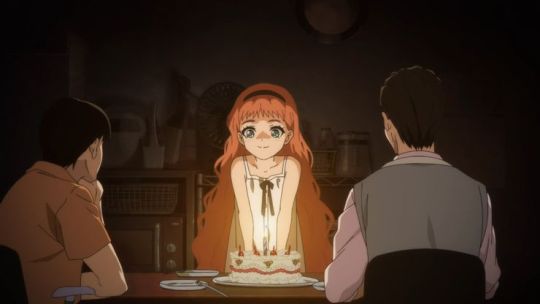
Can you even believe this bitch?
Acca and Ura-Acca also have documents talking about how warriors of Eros need to battle against Thanatos, the embodiment of death, but what’s that all about? We don’t really get into it. Is Frill somehow Thanatos herself? I mean... I guess maybe you could go that route, but I sincerely don’t think that’s meant to be the case. I assume she’s just another player in the game, and she happens to have taken Thanatos’ side in things. Her artificial existence and resentment of her fathers leads her to treat death flippantly. She was programmed to be selfish sometimes, and that selfishness has ultimately manifested itself in the worst possible ways. Intriguingly, we see Acca and Ura-Acca act similarly selfish in how they drive our four heroes to risk their lives just to battle Frill. Acca in particular shows that he’ll risk anyone’s life to get to Frill, who killed both his wife and daughter. But Acca never has to risk his own life. He’s just risking other people. Both sides of the equation are treating human lives like disposable pawns in some kind of war game.
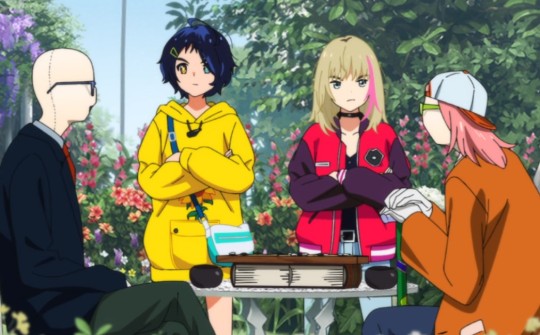
Y’all are SUPER-SKETCH.
It’s never really clear how these eggs work. We’re told that the Accas created the eggs, and honestly, I could’ve figured as much on my own. But they don’t try to explain how the eggs can contain the souls of suicide victims or how they manifest those people into dreams, and frankly, it’s probably better not to try.
I was really shocked that the girls actually manage to resurrect their dead friends. I was 100% certain that was going to be a scam and the point was going to be about learning to move on and live for the moment and appreciate those bonds while you had them, etc. And there is some of that. Alas, the price of resurrecting those people they care about is that the people in question no longer know them or remember them. That was pretty brutal... having our heroes nearly die over and over in service of people who ultimately will no longer care about them at all. Although they did the impossible and brought someone back to life, they had to lose those people all over again. I suppose this, like much fo the finale, emphasizes that we should appreciate our relationships while they last, because you can lose them for so many reasons. Regardless, I’m not surprised that Momoe just wanted to quit and avoid getting hurt after that. It’s understandable.
There’s a lot of discussion around parallels in the last two episodes. Parallel worlds with alternate versions of the self are raised multiple times, Ai gets an awesome encounter with a parallel version of herself that really brought her emotional journey to a head, and we even have to deal with a doppleganger of Neiru at the end. This leads to the revelation that Neiru looks exactly like her formerly deceased sister... a fact that presumably was part of what drove the sister to attack Neiru in the first place. Given that we’ve already been told that they were both genetically engineered, their identical appearances don’ seem that strange. But then the finale tells us that Neiru’s one dream is “to be human,” and suddenly the characters assume Neiru was an A.I. just like Frill. That... seems like a leap to me. I mean, she was genetically engineered to lead her company and never had a family of her own; no wonder she feels inhuman! So I’m not sure if I should take this at face value.
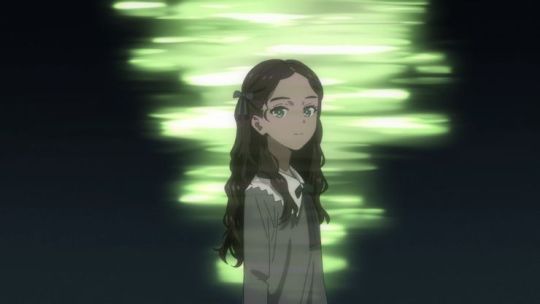
Neiru real or fake challenge
Another thing that I don’t think we can take at face value is Mr. Sawaki’s explanation of Koito’s death. In episode 12, we meet a parallel version of Ai who actually killed herself. The big boss monster for Ai to fight while protecting Alt-Ai? It’s a dark, abusive version of Sawaki. And our Ai inexplicably assumes this monster was made from her own fears. A very bizarre conclusion to jump to when you remember that every single boss monster has been the abuser of the victim that the girls were defending in that episode. By all available evidence, the Sawaki monster should be a parallel-world Sawaki who is very much exactly the scumbag he appears to be! Notice how Alt-Ai never says a damn word about the Sawaki Monster - never asks who he is or why he’s like this, etc? She’s not even surprised. That just lends further credence to my belief. FOLLOW THE EVIDENCE.
So in the finale, when our version of Mr. Sawaki claims (via a VERY awkwardly inserted voiceover) that Koito’s death was an accident after she tried to ruin his reputation because she fell in love with him, why should I believe any of it?! The previous episode introduced me to Abusive Sawaki! Sure, we don’t have any reason to assume our Sawaki is That Dick, but we JUST learned that he’s certainly capable. Furthermore, how could Koito suddenly be the ONLY accidental death among all of the available suicide victims in the dreamworld? She shouldn’t have even appeared there if it was just an accident! Although I’d like to believe that Sawaki was someone who Ai and the girls were jumping to conclusions about based on nothing... but it sure doesn’t look that way from here. And given how the show ends things, I fear we may have a hard time learning anything else about Sawaki. Ai changes schools and runs away, there is zero comment on what happened to Sawaki’s relationship with her mom... he’s just gone now.
As the final episode winds down, we see Rika and Ai fall back into bad habits, as they all treat Neiru just like they treated the girls they tried so hard to save. Rika acts disgusted by a friend and abandons her, treating Neiru the same way she treated Cheimi. When Neiru finally reaches out to Ai and calls her, Ai ignores the call and throws her phone away, thereby ignoring her friend’s needs in the same way she ignored Koito’s when she failed to record the bullying Koito was experiencing. You might even be able to connect Momoe’s choice to walk away for the sake of self-preservation to her decision to reject Haruka and walk away, honestly. And to compound the bad news that the show gives us near the end, we skip forward months to learn that Ai, Rika and Momoe have all drifted apart. Ai is in a new school, but we don’t see her with any new friends. She’s back where she started the show.
The difference, however, is that she doesn’t seem hopeless and lonely. She seems wistful, sure, but she never seems beaten down. She still treasures the friendships she built even if they wind up fading away. So there’s still a message in here about moving on, because even if you lose a person or a connection, it will forever matter.
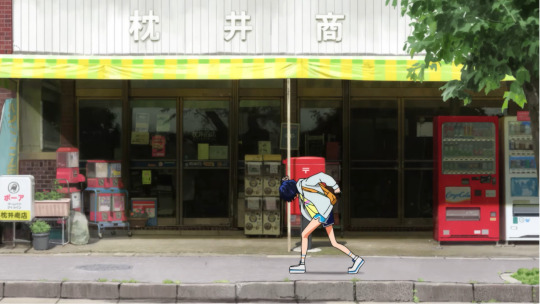
*insert engine rev-up noises*
In the final moments, we see Ai preparing to run in the exact same pose she used back in episode 1 when she first stood up to the abusers within the dreamworld. This time, she runs to grab her chance to reunite with a dear friend. She takes charge of her own future and her own self-worth, somehow gets back into the Egg Garden (even though Rika wasn’t even allowed to enter after she rescued her specified victim, so uh... how did Ai get back in exactly... ?), and insists she’s going to use the eggs to see Neiru... even though the eggs only let you see the dead up to this point, so uh, that doesn’t really make any sense either. Consistency, motherfucker — DO YOU USE IT?
Amidst all the uncertainty that the finale left us with, at least we can see Ai find herself in a more confident place. She spends much of the series learning to stop running from her problems in the real world. Even after she gains confidence in the battles of her dreams, she struggles to face reality. It’s a huge step when she returns to school. Yet even in the very last episode, she opts to run away to a new school rather than cope with seeing Koito each day. But at last, she decides to take charge of her reality and try to reunite with her new best friend, Neiru. She’s wavered on her path, but ultimately, she’s grown. Although you could simultaneously argue that she’s failing to learn the lesson that rescuing Koito should’ve taught her...
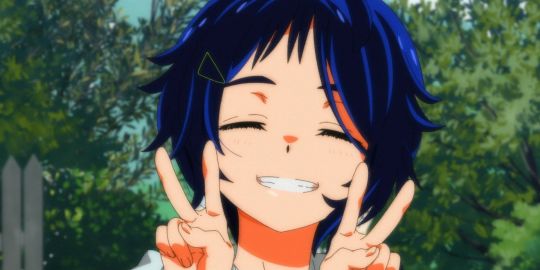
“Ai Ohto is BACK!”
I don’t think any of us expected this finale to be a cliffhanger coming into it. And unfortunately, we don’t know if there will ever be another season or a movie or anything. Given how people reacted to this finale with such overt hate, I really don’t expect anything more. And I think that would be a goddamn shame. Even with a finale that doesn’t quite stick the landing, I still found it fascinating and engaging. The series is more than worth the trip for the characters, for the themes and topics it explores, and even for the fluid action scenes and music. And this is a series that was made by first-time writers and a first-time director! Yet I’d easily call it one of the best animes from the past couple of years. For total newcomers, that’s a goddamn TRIUMPH.
So I hope we reunite with these girls again. I hope Ai manages to get the band back together, find out exactly what’s going on with Neiru, and face down Frill. Even if they never wind up in some ultimate battle with Thanatos, I don’t know that that’s the point. All of us are in a battle with Thanatos every single day, after all. They just need to show how they’ve all gotten stronger together and truly overcome the “Temptation of Death” by beating back Frill (and her ridiculously powerful dreamworld bug-people) as a unit.
But maybe that’s too obvious and simplistic of a message for a show like this one. Maybe this complex ending centered on the main protagonist’s self-actualization and the value of fleeing relationships is more in keeping with the melancholy nature of the series.
... I still really want to see the more obvious happy ending, though. I think they deserve it.
#wonder egg priority#ai ohto#wep#anime#anime reviews#wonder egg special episode#wonder egg priority special episode#wonder egg priority finale#wonder egg finale#wonder egg
48 notes
·
View notes
Note
the fact that edelgard is the villain in 3/4 routes and yet intsys STILL glorifies her to no end enrages and annoys me. no other villain has been given that perspective of “well actually maybe they arent so bad” except for the hypocritical tyrant. even when she has *literally become an inhuman monster* intsys is still like “oh no dont worry she was right actually!” and it upsets me deeply
It upsets me, too, friend. IntSys seems to really like glorifying people who don’t deserve it, especially in recent games (Walhart in Awakening, Rudolf in Echoes -- I can’t say if his whole ‘orchestrating a plan to have his son murder him’ thing is carry-over from Gaiden or not, but it definitely exists in the recent remake so I’m including it), but Edelgard actually ends up as a bit of a weird case.
(I have a lot of thoughts about this, so I’m just going to cut preemptively.)
Now, I’m actually not opposed to Edelgard being the protagonist of the fourth route in Three Houses. Anyone who’s been here a while knows that I generally see Grima, a figure that IntSys generally tries to paint as a rote villain, as at least a sympathetic villain (and possibly even a secret hero in the events of Awakening itself); it’s entirely possible for someone that’s a villain in most of their appearances to have legitimate reasons for what they’re doing and why, and revealing that in their personal route could be incredibly powerful if done well.
And here’s the thing: Edelgard really is a compelling character, in large part because of her moral ambiguity. I actually agree with her when she says that the Church of Seiros is corrupt at its core and the system needs to change. She’s right about that! While Seiros might have had decent reasons for establishing things this way, over the past thousand years human societies have changed while the church itself remained stagnant -- something potentially exacerbated by her selfish ambition to restore her mother -- and this has led to a structure that once served an important purpose becoming a toxic and destructive mess for humanity at large. Edelgard has a completely valid point there, and it’s something that I could absolutely get on board with if she had gone about achieving change in some other way, because she does have other methods available to her that she writes off without real reason -- and even that can relate back in part to her deep trauma and difficulty trusting people after the betrayals she faced at the hands of her “uncle” and her own father’s powerlessness to stop the nightmare she and her siblings suffered through.
IntSys probably could have crafted a narrative that showed from her perspective why she believed war against the Church was the only valid option available to her. The issue is that she undercuts her own argument by targeting all of Fodlan, rather than specifically going after the Church: she doesn’t give the Kingdom and Alliance a “stay out of my way or else” warning, she literally turns her sights on the Kingdom as soon as the monastery falls and attempts to fully annex it once Cornelia sets up Dimitri’s fall, leaving the Alliance only because she has her hands full with Faerghus. She didn’t have to take Cornelia up on her offer of making the Kingdom into the Dukedom of Faerghus and sending troops to finish the job: she could have just left the woman to her own devices, forcing the Twisted to utilize their own people to maintain and secure full control of the region while she worked on addressing the systemic issues, which would have had multiple benefits:
The Imperial Army doesn’t get overwhelmed and exhausted fighting in conditions they’re not equipped to deal with, leaving them stronger overall while the Twisted forces are potentially weakened by the same
Hubert is able to better assess the threat they’re dealing with, including learning their capabilities and possibly even where they’re coming from before Merceus
Edelgard actually puts her money where her mouth is and ends up helping the people she claims to be doing this for, rather than just using them as fodder for the war to grind up
Unfortunately, the way she’s written ends up just making her an imperialist. She’s not just going after the corrupt core of the Church, she’s trying to forcibly unite the continent and return Fodlan to some long gone ideal where it was all united under the Imperial banner because she refuses to believe that Adrestia could have split by natural causes.
Crimson Flower ultimately ends up being a particularly egregious example of this glorification phenomenon in action because they give her a personal route that makes no effort to critically examine her actions and make her face consequences for them. This, I think, does her a massive disservice as a character, because that aforementioned moral ambiguity that makes her so interesting could have been utilized to great effect -- and the proof is actually there already, because they do it in Dimitri’s route.
Dimitri is himself another interesting character, and outwardly presents as Edelgard’s polar opposite: he recognizes that he doesn’t have all the answers, struggles to figure out the correct course of action when presented with difficult subjects that have no clear-cut answer -- like the fact that reliance on the Crest system is toxic for noble families, but it’s those very Crest-bearers and their Relics that help keep Faerghus safe from invasion by Sreng -- possesses incredible strength but specifically refrains using it in most cases to avoid harming others, and generally takes everyone’s problems onto himself to his own detriment. He’s also deeply traumatized and was never given a chance to deal with it in a healthy manner, which contributes to how he snaps -- and Azure Moon starts with Dimitri being so far out of reach that you can’t unlock any of his supports and can’t even engage with him in the weekly discussions. He’s lost himself to his survivor’s guilt and need for vengeance, considers himself to be nothing more than a monster, and has no qualms about killing if it helps advance his quest; as the story progresses, he faces a direct consequence for this murderous inclination in the form of Fleche who attempts to exact vengeance for her brother’s sake in the same way that he’s attempting to claim it for his family and friends -- only to lose Rodrigue, and have his dying words be a plea for Dimitri to live for himself rather than those who died before him, at which point Dimitri sets his sights on opposing Edelgard rather than killing her and seeing to atone for the crimes he committed. While I think the game made the change a little too abrupt, it’s handled well overall, and shows a real development arc complete with both actions and their associated consequences that directly relate to Dimitri’s growth as a person.
Contrast this to Edelgard in general and Crimson Flower as a route. Edelgard believes that she has all the answers despite not trying to engage with anyone outside her own House, decisively chooses what she believes to be the right and proper course of action regardless of how difficult the subject matter, possesses great strength (both physically and of sheer will) that she uses to dominate others, and forces others to join her in addressing what she sees as problems -- such as her line about making her own people into “worthy sacrifices” for her “higher cause.” Crimson Flower is the only route where her attack on the monastery fails to capture Rhea, but once Byleth returns she sets her sights on attacking and subjugating a territory that has remained entirely neutral through the past five years, turns on the Twisted while she’s still in a vulnerable position which ultimately causes the deaths of at least a third of the forces she left at Arianrhod once they fire their warning shot, lies to her friends and allies about what happened there, murders her step-brother, and allows a city full of trapped civilians to burn unchecked while she deals with what she considers to be the “real” threat on the opposite side of the Faerghus capital -- and all of this is capped off with her never dealing with the Twisted, and cute little endcards that talk about how everything worked out fine and there were no problems ever, The End. Edelgard doesn’t get a development arc in her route: she’s never challenged, she never faces real consequences (and the one she does face she literally lies about to her friends and then leaves as a problem to deal with later), and she pretty much ends the game exactly where she started it: completely assured that she made the right choices. The moral ambiguity inherent in her character is instead cast as “of course she’s in the right, she’s so great and there’s nothing at all wrong with what she’s doing or how she’s going about it, isn’t she wonderful?”
At least in the main game, Hegemon Husk Edelgard is treated with real gravity, shown as the pinnacle of her drive to see her ambition come to fruition and the tragic consequence of her inability to change course and find another path. The Forging Bonds event just takes the CF brush and paints her actions as the right ones, even though what made her so compelling is that her reasons were right while her methods were horrific. Edelgard really could have been wonderful. The potential is right there in her character. But IntSys completely botched the execution of it, so that her route feels rushed, incomplete, and at best unsatisfying (or, if you’re me, utterly disgusting for how it glorifies imperialistic conquest), and her Heroes appearances only make it worse.
#answered#anonymous#fire emblem: three houses#edelcourse#look i really do find edelgard to be interesting#i just find intsys' execution of her character to be utterly terrible#and fandom at large has kind of made it worse#i'm just going to keep the nuance and explore the real consequences#and write a ton of fanfiction to that effect
30 notes
·
View notes
Text
The development of Law’s relationship with Zoro - Part 4: Dressrosa, The Breaking Point (Aftermath)
<<Part I: Before Meeting>> <<Part II: Sabaody Archipelago, The First Meeting>> <<Part III: Punk Hazard, The Alliance (A)>> <<Part III: Punk Hazard, The Alliance (B)>> <<Part IV: Dressrosa, The Breaking Point (The Plan Failed)__ (Saving Law)__(Protecting Law)__ (Birdcage, Pica and Doflamingo)__ (Aftermath)>>
Even though admiral Issho alongside with his men officially apologized to King Riku and the citizens, the king made sure the “outlaws” were hidden from marines. Straw Hats, Law, Bellamy and Kyros ended sheltered in Kyros’s home where he once lived with Scarlet and little Rebecca. First time in a long time, the allied pirates were together again. In the night, Sabo visited the house, but beside Zoro, Franky and Robin, everyone was sleeping. The four had a talk about Sabo’s past and the best time to leave Dressrosa before marines will attack them.
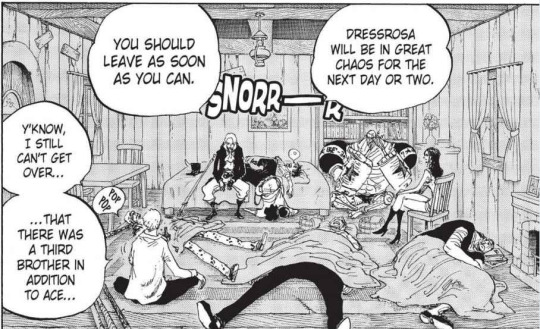
Law’s sleep position was much more relaxed and open than the one from the beginning of Dressrosa arc (chapter 794). Maybe it was just the result of total exhaustion and injuries or maybe Law, after so long of stressing and worrying, finally could relax knowing that A) Doflamingo was in marine custody thus no longer a threat and B) he was safe around Straw Hats.
The available room was small but Law could choose any spot to sleep. Instead, he was shown lying close to drinking Zoro (by frame layout alone, again in between Roronoa and sleeping on bed Luffy, this time without any danger around). Zoro most likely planned to stay awake through the whole night for security measures (he has this habit of sleeping just 3 hours per night after all) and taught by experience, Law didn’t have any reason to doubt that if attacked, the swordsman would protect him, the same as he did during battle.
Law didn’t even bother to pretend he was cautious or wary, he simply slept, trusting allies to take care of their safety.
With Zoro, Franky and Robin being the only one awake, there is a high probability they talked about the latest events. How their fights went, what they learned, what to focus on, what to watch out for in the future with angered Kaido as the next goal on alliance’s list. It’s hard to tell for sure if Robin told others about Law’s choice to stay behind and whether in victory or death, share Luffy’s fate. On one hand, it was a choice made under strong emotions, trauma and even the feel of responsibility for Straw Hat’s wellbeing. A choice made because of very personal matters. On second hand, exactly because it happened under such pressure it was the most sincere side of Law Robin had a chance to see for herself. She and Zoro are the least trusting members of the crew and that night was the best moment to discuss in detail what happened and in the process dispel any remaining doubts about Law as their ally. Both saw his determination and fighting spirit, knew he saved their crew members and kept Luffy out of harm's way despite his own injuries and finally, both had some understanding of Law’s hidden goal in Doffy’s destruction. They may not know the whole truth, just the nature of it, but that was enough because Trafalgar did not betray them. And well, he had the suicide feel about himself what could raise some concerns about him too.
I personally think such talk could happen that night, when memories of battle were still fresh in their mind and everyone out cold beside the three of them. The exchange of information could be another reason for the change in Zoro’s behaviour.
For the three days, the Straw Hat-Heart alliance was left in peace by marines. Once again Law was exposed to Luffy’s antics but this time Zoro acted in a more open way, even showing his more usual irritation at other people’s odd behaviour, including his own captain:
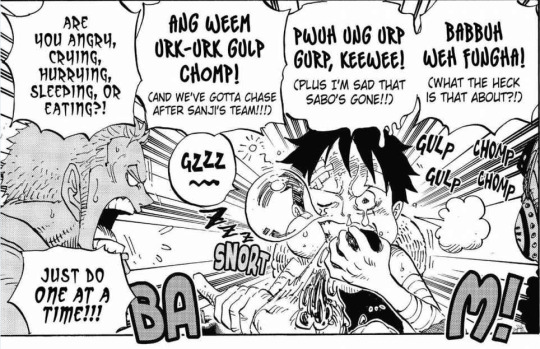
Interestingly, there is a visible shift in the arrangement of characters positions - during battle it was usually Zoro-Luffy-Law and the dynamic changed mainly in face of danger. Now with upcoming frames somehow Law was put more often in the middle between the other Supernovas. Even though Trafalgar still kept some tangible distance from others, judging by their (not so strictly stoic anymore) behaviour, it seems like he and Zoro were now more comfortable around each other.
Then the navy finally made its move against pirates. Unlike Usopp, Zoro and Law didn’t show any distress. Bartolomeo and other fighters prepared themselves for such an occasion by securing for Luffy’s group a safe escape route. Instead of running away with his friends, Luffy decided to visit Rebecca - now a princess - and confront her about her family matters.
Zoro reminded Luffy they don’t have time, so he better get it done quick while the rest will wait in eastern port...

and then again, run in the wrong direction.

At this point, Law may have a good suspicion about Zoro’s no sense of orientation (chapter 797). And who knows, maybe he ran alongside Zoro (on picture below, behind Kinemon and Robin), to make sure the infamous Pirate Hunter did not wander unexpectedly somewhere else… that, or both planned to linger behind and secure the group retreat.
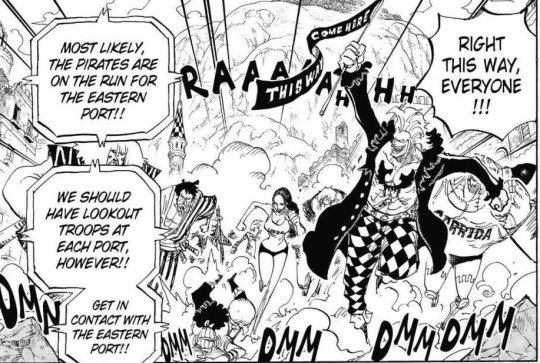
The fellow fighters came to their aid, keeping marines far away from Straw Hats. At the same time, Law disappeared without a word, to find and confront recently arrived on the island Sengoku (unless he did mention his intention to Zoro, while they ran side by side??). Frankly, the manga did not provide the reaction of Zoro nor any other member of Straw Hat crew to Law’s disappearance, so it’s impossible to say if they were worried about him or simply trusted in his strength to return on his own on time.
Meeting with Sengoku was one of the most important breaking points for Law. As it turned out, the former fleet admiral treated Donquixote Rosinante - Law’s savior - as a son. And for thirteen years did not understand why his beloved son didn’t follow the order to stay away from Minion Island.
“One day… a soldier I knew died. He was someone I cared about, someone who meant something to me. I took him in as a boy… and treated him like a son… He was as honest and upright a person as I ever knew… and a valuable, trustworthy subordinate. But there was one time, just once in his life, that he lied to me. I had been betrayed… but there must have been a reason for it. Four things disappeared in the chaos of that fateful day. The Barrels Pirates, the life of my subordinate, the Ope-Ope fruit… and a boy with White Lead disease who was with the Donquixote Family at the time.”
Law admitted he was the boy and confirmed that Rosinante left his post and died because of him. Admitted also he didn’t know if the way he lived was what Cora wanted.
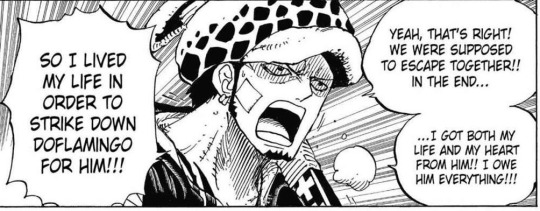
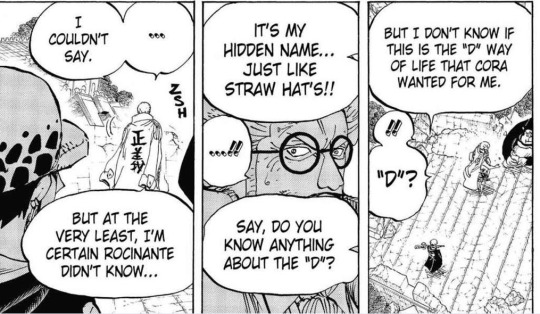


First time in 13 years, Law was assured that there wasn’t any hidden goal in Cora’s decision to save him. The man saw a dying, hurt child with the spark of his brother’s madness and decided Law was worth loving and dying for. It was unconditional love, without any “if” or “but”. The “D.” name and the usefulness of Ope Ope no Mi did not matter. Even stopping Doflamingo meant then little. The only thing Rosinante wanted was to save Law and make him finally free. Sengoku literally told Law to not “attach a reason to the love you’ve received”.
Apparently, english “I love you” does not carry the whole meaning of the original phrase “Aishiteruze (愛してるぜ)”. Rosinante’s declaration was along the “I can’t live without you” level of loving someone (x). Now, after so many years of hiding from Donquixote Pirates, planning and scheming and living just to kill Cora’s murderer, Law finally understood the depths of Rosinante’s love. The breaking point is that: Law at last knows (accepts) he was unconditionally loved and now, is free from Doflamingo for good. He can allow himself to finally live without doubts and regrets the way he wants, without a sense of failing some unknown to him expectations. And I think, to some degree, it is the reason why Law’s secretive / introverted behavior changed into a more open, relaxed act around Zoro and Straw Hats. Because he finally could relax, be comfortable with himself.
Due to danger from admiral Issho, Law couldn’t spend more time with Sengoku and had to run to the rendezvous point. Surprising, no Straw Hats waited for him (in the sense, weren’t shown in the frame). Even more surprising is the lack of Zoro between former colosseum fighters in the frontline of the fight. Anyway, Luffy showed up soon after Law but instead of dodging the blind admiral, attacked him. Because to be Pirate King he must face everyone: Warlords, Admirals and Emperors and beat them down.
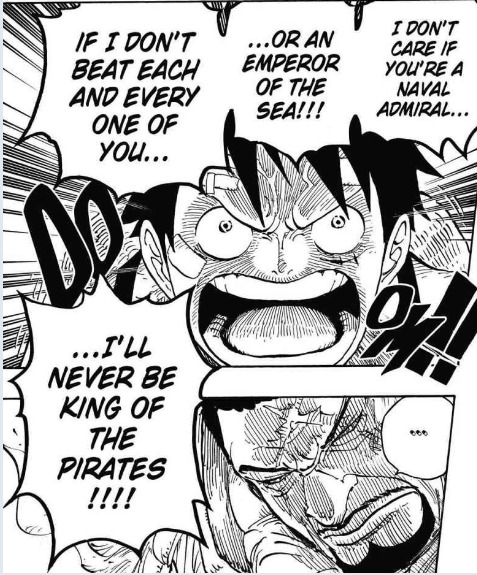
Zoro in general agreed with Luffy’s reasoning (chapter 799) but did not exactly understand the way Luffy fought against Issho, telling his blind opponent what kind of attack he was going to use. The admiral himself was very surprised by that too, but ultimately accepted and even respected Luffy’s weirdness. In the end, Issho managed to send Luffy flying - what happened to be a favorable circumstance for allied fighters. They catched Luffy and despite Straw Hat’s protest, dragged him to safety. Zoro was happy about that too, but for a different reason - he wanted to take Luffy’s place to fight with a powerful enemy. Bartolomeo thankfully managed to stop the battle-lusting warrior.

Law’s reaction to that event wasn’t shown but once again he had a chance to see Zoro’s insanity when it came to fighting a strong enemy. Zoro and Luffy in that regard were very similar to each other.
Straw Hats-Heart alliance finally got on ship, the Yanta Maria and with the help of people of Dressrosa (who under the pretext of chasing the pirates away, were actually protecting them from the admiral's deadly attack), the alliance sailed away safely.
Zoro and Law's reaction to Yanta Maria was visibly distinctive from pleasant shock of others (open jaws). Zoro smiled, Law, judging by the frown, looked unimpressive. Both their reactions were more quiet and toned down.
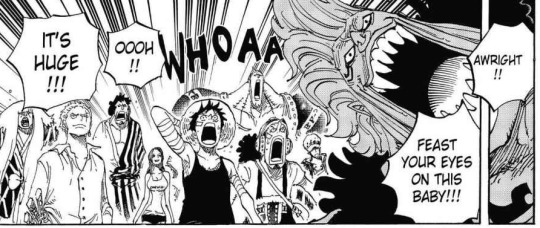
On the ship, Bartolomeo and fellow fighters asked Luffy to drink with them “cups of Father and Sons”, to officially accept them as his underlings.

Luffy of course refused, because he A) didn’t like alcohol and B) didn’t want to be captain of such a big fleet. Zoro warned his allies they wasted time trying to change Straw Hat’s mind (and to just give the sake to him). Yet the fighters were ready to force Luffy into accepting the drink. Further Luffy’s explanation only confused everyone (beside Straw Hats) even more. Including Law.

And then Law’s attention immediately turned to Zoro, who, taking advantage of the opportunity, started drinking sake from Luffy’s cup to Usopp’s displeasure.
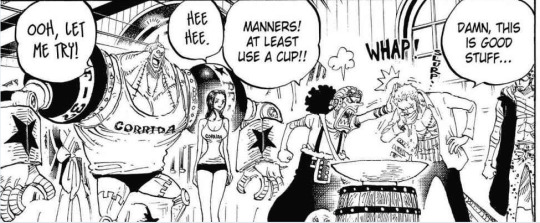
Finally, Luffy managed to explain his reasoning:
“If I ever think we’re in trouble… I’ll shout for your help. Then you can come save us! I don’t have to be a boss or a great pirate, right?! If you’re in trouble, call for us!! We’ll come and help you!!! I won’t forget about how we fought Mingo together!!
And the Seven Leaders admired and accepted Straw Hat’s decision. But since Luffy was all about freedom, they simply followed his example. Whether Luffy liked it or not, they decided on their own to make him their boss.
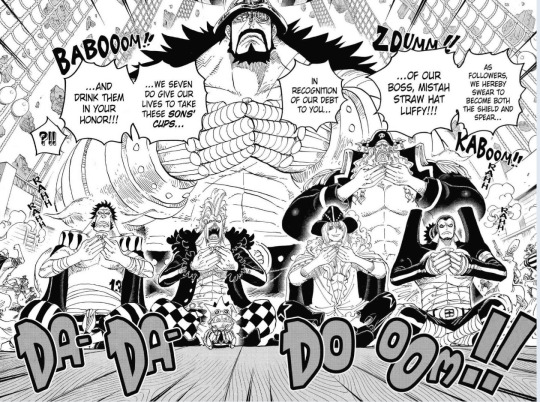
Law thus witnessed the founding of the Great Fleet of Straw Hats. And yet, somehow it looked like he was more interested in Zoro’s drinking sake behind Luffy’s back.

When party started, everyone celebrated their great victory (chapter 800):
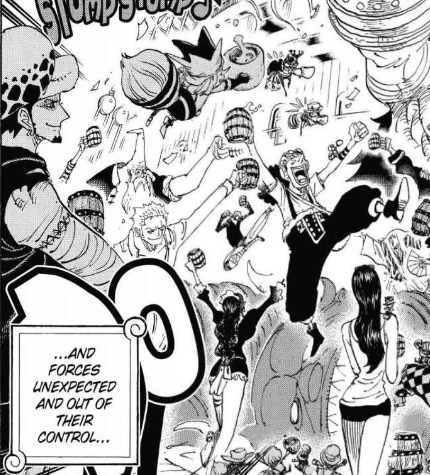
Luffy, like always, was in the centre of everything. Law, though smiling, kept his distance from Zoro and other partying people. But soon after that Law’s personal space was invaded by Zoro.

The anime expanded this little moment, first showing Zoro approaching Law sitting alone, asking to join the rest. And then, ignoring any protests, just threw his arm around the other man’s neck. Law’s face spoke how much he minded such treatment and had no dignity about that:
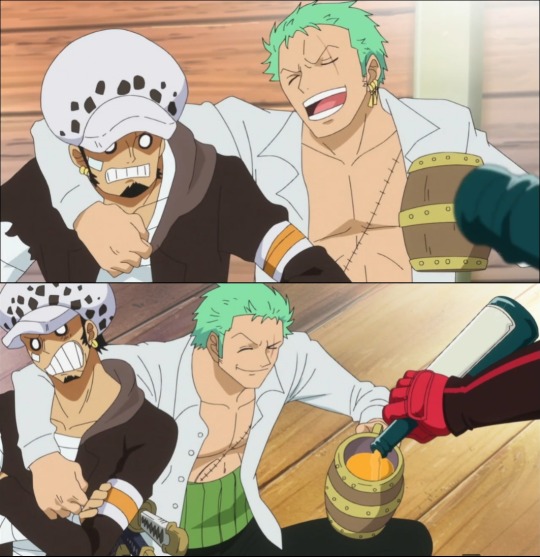
During parties, Zoro always spent his time sharing alcohol with people who fought side by side with him (Paulie, Water 7/Enies Lobby) or actually were his opponents (Braham, Skypiea). Zoro didn’t have a habit of forcing people to drink with him or asking (introverted) person who clearly wanted to be alone to join the bigger group. He himself rarely joined larger groups and usually just sat somewhere far from the noise with a few people around. So, Zoro most likely understood Law's isolation since he used to do so himself. Here though he was the one invading Law’s personal space and not giving a damn if the man was happy about it or not. On second thought, if Law didn’t want to join the others, it made sense for Zoro to join him. In a sense, it could be Zoro’s way to break the ice between them. What is even more interesting, considering the palpate distance he kept from Law at the beginning of the story. The second important detail - Law could easily get out of that situation by using Ope Ope no Mi powers. A simple switch of the places and he would be free for good. Yet Law remained, despite how awkward and/or outside of his comfort zone it was.
We may only wonder what made Zoro act in such an uncommon way. Was that respect for Law forged in the heat of battle? Did it bother him that Law after everything was done, still isolated himself? Did it look like Law felt discomfort to be around people he barely knew or interacted with and who all pledged loyalty only to Straw Hats, thus Zoro decided to keep him company?
Zoro initiating physical contact in itself is an uncommon occurrence. Because as much as Straw Hats pirates can - and will - invade Zoro’s personal space, Roronoa is not exactly the type of person open to such contact. Once again, the shift between the beginning (visible distancing) and ending (invading Law’s personal space) of the Dressrosa arc is tangible. Somehow between one and the other, breaking point in Law and Zoro’s relationship happened and changed for good their dynamic. What was seen day(?) after the party (chapter 801):
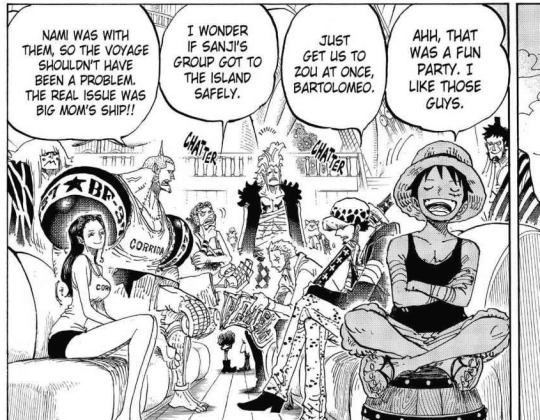
Law and Zoro sat close to each other, the previous distance gone. Zoro was reading newspapers, indifferent to his surroundings - instead of facing and observing the Heart captain, like he used to do at the beginning. Both men looked like they were comfortable around each other, even despite - or maybe, because of - the shared (forced?) drink. The change in Zoro’s behaviour is diametrical.
Like was said at the beginning, Dressrosa Arc is one big breaking point. It changed the status quo of pirate alliance and Luffy’s position, from rookie pirate to leader of a powerful fleet. It will lead to the complete dissolution of the Shichibukai system and for good push the main hero into collision with Emperors. For Law alone, Dressrosa was like opening old, still not healed wounds but also so needed a moment of catharsis. He was ready to die there, but was saved time after time by allies. In a sense, it was the final test of how strong the alliance was before facing angry Kaido.
Law changed a lot through the course of action. Or maybe not really changed, but like allowed himself to show hidden emotions and trauma. The cold-blooded, scheming pirate who planned to use Straw Hats crew (and spare his own) turned out to be a man willing to sacrifice himself to finish what his savior started but couldn’t do himself. Who came to believe in Straw Hats, as the ones who made miracles happen. Not only Luffy, but the crew as a whole.
The same as Zoro finally saw Law in hopeless, awkward, sometimes outright humiliating situations (anime extension), Law’s impression of Roronoa cracked too. No sense of direction, insanity to laugh at the dangerous enemy and enjoying the thrill of fight, the fondness of alcohol -- all of this created anew image. This time more flawed but at the same time, more real, human. Despite the flaws and awkwardness of previous situations, both proved to be strong-willed, cool-headed warriors one may rely on in difficult times. Zoro stretched out his hand to him, broke the ice, abandoned the distrust that distanced them for a long time. It seems like Law was finally fully accepted by Roronoa and all unsaid things between them settled down for good.
At the same time, the arc showed their similarities. Both were the quiet ones, the type of people who kept distance from others. The ones with pragmatic thinking in contrast to Luffy’s chaotic madness. Zoro for sure was a helpful presence during running from enemies and meeting a weird fighter after another, especially since he did try to keep his captain in check. That it didn’t work for a long time is a different matter.
Anyway, looking at the beginning and end of Dressrosa arc, there is a visible change in how Zoro and Law acted around each other. How the neutrality changed into something more comfortable.
Here comes things worth examining a bit more.
↪ The Seven Leaders pledged loyalty only to Straw Hat Pirates. As long as alliance between Luffy and Law will work, this is not a big issue and to take down all Emperors, every additional help was good. But if ever those two pirate crews will fall apart, Luffy literally just gained a powerful fleet, thus has advantage over rival captain.
↪ Straw Hats & Heart captain worked together to take down Doflamingo. Luffy of course was the one that finished the enemy, but overall, Luffy’s victory was a result of teamwork between pirates, colosseum fighters, marines and common people. As much as Trafalgar Law was well known as the Shichibukai, Luffy and Zoro were in fact the ones that made the biggest impression on people (colosseum fight, defeating Doffy & destroying Pica) and actually interacted during battle with other fighters. Frankly, both showed their charismatic nature that made people believe in and follow them. Luffy became the hope of the whole country. Zoro was the spark that united people to stop the birdcage and brought Luffy the needed time to recover. Law is powerful and has a reputation and knows how to deal with different people to get what he wants, but he is not really good at interhuman relationships in general. Luffy gains friends on the left and right. Zoro, despite being asocial, rude and introverted person, has the impressive air about himself that often makes him look like the coolest person who is not afraid to challenge everything and everyone; for whom impossible does not exist (destruction of Pica, stopping birdcage). Law… kinda lacks in that department.
↪ Because of the made impression on other fighters, there is a big chance Law may have heard some retelling of the events during the party. Luffy and Zoro aren’t men who brag about their exploits, but Bartolomeo and his companions had a lot to share about battle. With so much alcohol and so many strong individuals that were very impressed by Straw Hats deeds, it seems logical that tales of battle would sooner than later be told. Especially by devoted fans like Bartolomeo. Zoro’s daring plan to defeat Pica and stop Birdcage could be recalled by those fighters who saw it themselves, filling Law with missing fragments of the battle.
↪ Frankly, shonen mangas have this one upside down that the final boss must be defeated by the main hero. Which means that characters who actually could do something useful (damaging) to the enemy are pushed to the sideline. Like Robin, who can snap a person's neck from far away thanks to Hana Hana no Mi. Or Zoro, who could join the other Supernovas in their fight against Doffy (either before Law’s threatening injury or after, instead of stopping the birdcage). Or dwarf princess could heal Luffy for a few minutes to finish Mingo once and for good. It’s not exactly a complaint, because it's the standard formula of One Piece story, but because of such, Law and Zoro were pushed into the background, for Luffy to shine. For most of the arc, Luffy was the main figure in the dynamic of Supernova Trio. They did not interact much in words, but the layout of frames - the character position and background activities - created the feeling of the slowly forming bond between Zoro and Law. Now, after Doffy’s defeat, there is a shift next to whom Trafalgar sticks (Zoro) and Luffy is unnecessary for them to interact on their own.
↪ Law didn’t care how high was the newest reward for his head. In contrast, Zoro was pleased to learn his own increased a lot. Even asked for alcohol to celebrate. What could turn into another moment of Zoro dragging Law into drinking.
↪ The last detail (though I’m afraid it may vary from one translation to another) is the way Law addressed his allies. Luffy usually was the Straw Hat-ya. The girls were titled as Nami-ya and Nico-ya. Usopp as Nose-ya, Sanji as Black Leg-ya, Chopper as Tony-ya. Unless I missed it, I don’t think Law addressed Zoro directly to use either his name or made up nickname. They really didn’t talk much throughout the course of the story. There is a chance it happened after freeing Dressrosa - either during the three days when everyone waited for Luffy to wake up or during the party, once alcohol was shared. Zoro, depending on translation, called him either Law or Traffy (or similar form of the nickname).
With the chapter 802, the Dressrosa arc can be considered closed. Now, the Straw Hats-Heart pirate alliance sail to meet their missing crewmembers and to prepare for the fight with angry Kaido. How truly comfortable Law and Zoro became around each other will show the next place: Zou.
#one piece#roronoa zoro#trafalgar law#The development of Law’s relationship with Zoro#zoro & law#monkey d. luffy#straw hat grand fleet#my analyze#finally the dressrosa is done#dressrosa arc#man this arc was painful to write down#so many things happenings#on one hand so little zoro & law moments#on another the effects and differences between zoro & law and luffy gave a lot to think about
41 notes
·
View notes
Note
I honestly think Infinite Crisis was supposes to make Dick a Christ figure. His morality literally saves the world. Your thoughts?
Eh, to be honest, I wouldn’t have been a fan of that (and I hiiiiighly doubt that’s where Didio was going with that because he likes people being LESS focused on Dick’s impact, not more).
I’ve expanded on this a LOT in the past, too often to really want to go into it all that much again, but hopefully this will bring up a lot of those older posts as “more like this” options.....
But I really really REALLY dislike the emphasis canon and fanon tends to put on Dick at times as being so much more moral and pure and just GOOD than other characters, especially when its framed as something that’s innate to him, like its fundamentally just who he is.....
Because to me, that devalues it and him so much.
Doing the right thing, being good, its a choice one makes with every single choice they make. And our tendency in society to try and sort people into “good people” and “bad people” just glosses over that and ends up excusing so many of the bad CHOICES people make as they just go “oh I guess I’m just an asshole” and like....hiding behind that as though they never really had a choice in the matter, doing the right thing instead of the wrong thing was never really an option, because they are who they are and who they are is just an asshole, y’know?
And at the same time, it actually takes away from the triumph that is Dick Grayson consciously, willfully making the choice to do good with so many of his actions when there’s so much temptation and justification for him caving to making a less moral choice most of the time. I think this is a huge contributor to people hyping up the one good deed various villains or antiheroes make at times in the comics, while paying no real attention to the ten heroic things Dick does for every one of those....because there’s nothing really impressive about making the right choice, the hard choice, when its because you’re just innately a good person, a ‘better’ person than everyone around you. There’s nothing to celebrate or honor about someone making the decision to be helpful and healing and positive with their actions and contributions to stories if there was never any doubt that they would go that route, and they never really had the option to make a bad choice there and then instead.
Which then culminates in so much of the nit-picking we see in fandom (and with characters in canon) as people attack and condemn every single little thing Dick does wrong even at the exact same time they gloss over other characters in the same stories going around committing murder, betraying and backstabbing other friends or family, and a hundred other things. Because Dick is SUPPOSED to just be ‘better’ than everyone else, and innately just a good person while everyone around him has to STRUGGLE with their morality, any time Dick does anything that’s less than 100% noble or that prioritizes himself in a selfish way or even just is him expressing bitterness or resentment at his own mistreatment.....this is framed and contextualized as a FAILING of his. He’s failing to live up to the standard of “the best, most moral person in the DC universe, the multiversal constant” instead of accepting that he’s just a man like any other character, and every choice he makes is the end result of his own internal struggle against right or wrong. The fact that he so often makes the right choice or the more positive or helpful choice, even at his own expense a lot of the time....THAT is what makes him Dick Grayson....and that IS to his credit.....but the problem is, he never gets that credit when he’s just cited as being so good and pure and noble, because people are like “well duh, what else was he going to do? The wrong thing? The selfish thing? LOL, that would be OOC.”
And so he’s put up on a pedestal he has no reason to be on any more than anyone else does, and condemned every time he fails to live up to the impossible expectations that come with being placed up there......which means, he either never slips up and does anything that would go against the idea he belongs on that pedestal....in which case he’s rendered two-dimensional and cast as ‘impossible to relate to’ given that nobody is just so innately good that they make the right choice all the time, no matter what......
Or else he does slip up and does things that go against the idea he’s supposed to be on that pedestal and STAY on that pedestal....in which case people call him OOC or write essays about how what he did was so fucked up when what he did was like....have one fight with someone where he said mean things to the person saying mean things back, and somehow this ends up magnified to being on an equivalent level to actual murder, torture, cheating, betrayal and other things that are associated with other characters as their ‘flaws’....
Because this is what people point to as his flaws, and thus when talking about characters and flaws in general.....these things end up on the same level as those other things and thus get blown entirely out of proportion, when those same choices or flaws on display with any other character would barely warrant a second glance with fans.
So I just really really really dislike any association with Dick and Christ-like imagery or symbolism or implications, and extend that to pretty much any and all talk of him being so much ‘better’ as a person than even other DC heroes, or just innately good or kind-hearted or virtuous....
Because Dick Grayson is all of those things, I think, yes....but he’s all of those things by CHOICE, because he makes the choice to do things and act in ways that lead to him having that reputation, even when he has every reason in the world to lower himself into the muck and roll around in it like every other character gets free rein to do when they’re recovering from trauma or facing someone who’s hurt them or taken a lot from them.
And that’s not easy, but the difference between him and so many other characters isn’t that its any easier for him to make those choices.....its that he does it any way, despite the difficulty.
And that’s why I always spend so much time focusing on the fact that Dick killed the Joker, and that he was originally intending to kill Zucco before he decided he had more to lose and nothing to gain from it. And why I talk so much about the fact that killing didn’t break him, and likely wouldn’t break him if he felt he had to do so in the future in defense of his own life or to save someone else, or even to avenge another family member like with the Joker and Jason, or if he did so under someone else’s control or while brainwashed by the Court of Owls, etc....like, he’s not ‘too good’ to kill someone without it destroying who and what he is, the way that’s often framed with him.
And its why I’m so defensive about Dick’s infamous temper, and never because I think its OOC for Dick to be angry, but because I think the problem is he’s never ALLOWED to be angry, never considered justified, with his anger portrayed as something readers and other characters understand and support him expressing, and instead is pretty much only ever just labeled a character flaw, with it coming up in the context of him being TOO angry, TOO hot-tempered, TOO hair-trigger. Unreasonable, irrational anger, the kind that makes him hard to deal with instead of someone you root for when they get angry because they SHOULD be mad, the situation calls for it.
Because Dick has the same spectrum of emotions as any other character, and to deny him the same access to all of those emotions, not just the good or happy or positive ones, is to cut him off from a full half of his potential portrayals or depictions.....which y’know, pretty inevitably leads to a less realistic, less fully rendered or three dimensional character....which is what people often cite as why they don’t like him as much as other Batfamily characters, why he’s harder to relate to. Well no duh, when you restrict him from displaying or acting on half the emotions that make up the human experience! He’s going to seem less human, more ‘pure/noble/above it all’ - and nobody’s going to find someone’s struggles as compelling when the likely outcome of those struggles is expected to be Dick making a choice that’s so good, so honorable, so PURE, the mindset required to make that choice would be virtually unattainable for any of us - thus there’s no incentive, or even the possibility, of placing ourselves in his shoes, trying to view a situation through his eyes.
And Dick has the same option to make the negative choices, the harmful choices, the toxic or vindictive or vengeful or selfish or self-centered or callous choices that are available to every other character and every reader when following his stories and picturing themselves in that situation.....but when Dick never ever makes any of THOSE choices, and indeed, is never given even the option by the narrator, of making those choices - and has no chance at the forgiveness or understanding of readers, SHOULD he make those choices.....then again, of course you’re going to wind up with a character people find harder to relate to, and see little reason in putting in the extra effort to do so.
Because who wants to follow the stories of a character who makes them feel bad or dirty or ‘lesser’ than him by virtue of the fact that he never acts on a situation in any of the more negative ways people feel they might act if they WERE in his shoes....who wants to actually project themselves into those shoes if the end result is just going to be them feeling UNHEROIC simply BECAUSE they tried to relate to the hero and came away with the impression that this was a wasted effort, because they could never be as pure and good-hearted as that, they’d be too tempted to make the more selfish choice at times, the more vengeful choice, the more HUMAN choice....
And all of the above stems from just one simple thing, one sole mindset....
The idea that there are some people who are just innately good, and who don’t have to struggle to MAKE the good choice, the noble choice, the heroic choice....because they’re just so pure, so down-to-the-bone honorable by virtue just of who and what they are......and thus, if we’re not that way ourselves, if another character isn’t similarly regarded....there’s not even any point in trying to relate to that first character or be more like them....because its impossible.
You’re either that good by nature, or you’re not. You’re either Dick Grayson, or you’re no Dick Grayson and by extension there’s no point in even TRYING to be. No point in aspiring to be more like the example he sets in-universe or out, no point in trying to view him as an ideal to strive for instead of a benchmark for how far from a good person you are by nature and should just make your peace with being less ‘good/pure/noble’ than.
And so I’m always going to be knee-jerk UMM NO and also BUT HOW ABOUT NOT any time any discussion of Dick’s pure-of-heart status, too-good-too-noble-to-kill-and-not-be-just-shattered-by-it status, or any allusions to Christ-like symbolism or messianic narratives come up. I’m just always gonna be like, NOPE, no and also thank you but I like my Dick Grayson the same as any other hero, anti-hero, villain or just casual lookie-loo watching the superhero brawl happening downtown on their lunch break.....just a person, no innately better or worse than anyone else, with the same temptation to do wrong, be selfish, inflict retribution as the next person, and occasionally falling prey to his worse inclinations or instincts or behavior....
Because THAT’S what makes all the times he DOES rise above that behavior and set a standard in-universe for what a hero should be like, COULD be like, an example that actually CAN be followed, and met by others striving to make similar choices to him because they’re inspired by the fact that he makes those choices rather than resentful because they can’t imagine ever even being capable of making those choices....
THAT’S what makes all of that actually mean something, IMO.
Not his status as the DC universe’s multiversal constant and just all around best, most virtuous or good-hearted guy, an unreal gift that no mere mortal could ever actually hope to match or live up to.
65 notes
·
View notes
Text
Mental illness and media: straight up not having a good time, bro.
Between Endgame, Star Wars and Game of Thrones, I’m very disappointed in how current media displays and discusses mental illness.
Endgame made Thor, who was obviously suffering from major PTSD and depression, into a sad joke. I know, it was somewhat realistic, I will give you that. A coworker told me he liked ‘fat Thor’ because he’s been there. My man...I’m still there, right now, have been since I was about 5. And it wasn’t what they turned him into, it’s how they treated him when he was at this stage. I hated that every single time he was on screen people were laughing at him. :( I had another coworker look me in the face and say, “But lots of people who are depressed are comedians. I mean, you’re hilarious!” I...had no words.
Star Wars is...(wildly gesticulates with my hands). I have never seen such a clear depiction of depression than Luke Skywalker. Even Ahch-To itself was purely a depiction of what most people describe depression as. I took an art class recently and when I tried to paint what depression feels like, my instructor perfectly put into practice what it is. Emptiness. I hated this movie so much because I felt like it was showing me all these terrible things happening to people, through no real fault of their own. Then you have Kylo Ren, who is the embodiment of childhood neglect, another thing I know very well. The fanbase has treated him like a joke, a ‘crybaby’, evil, etc. I just wildly relate, but I’m terrified that I am a joke too, a crybaby, and evil. :(
Then there is Game of Thrones, which has hurt me the most. They made Daenerys into a literal monster. Like moreso than the actual monsters of the whole show. An undead ice demon, who wanted to erase humanity, feels more human than what they have turned this broken girl who has lost everything into. And the fact that they’re using “Oh well her whole family is like this so...you knew she had no hope” as their reasoning. Myself coming from a family with strong genetic dispositions toward addiction, bipolar, depression, ADD, and anxiety, this just isn’t the message I signed up for. That’s fine, I know media doesn’t have to cater to me and my issues, yet I still have such a sour taste in my mouth over this disaster of a character assassination. Like who’s next, me? Is this how others see me, as a monster, because my brain chemistry won’t let me make all the right choices?
I have read people saying “But that’s what makes them interesting! What do you want, boring heroes like Superman or something?” No, Denise, I don’t want boring characters...but is this the only answer? (also Superman is not boring jfc)
The thing is, I do agree with this to an extent. I don’t want characters to be vanilla. I don’t want chipper Beckies and Chads who always make the right choices, who always end up gleaming heroes. I just think there is better ways to handle complicated people. Penny Dreadful handled mental illness stunningly well. Fury Road also displayed remarkable heroism among people who have been hurt about as much as you can hurt anyone. Sherlock of all things, is 4 seasons about two men dealing with trauma, and they did it so beautifully.
I’m just very tired. I’ve suffered with mental problems since my very first memories. Having been in fighting for so long to get it under control, these blows have just come at a bad time. I just wanted to talk about it with someone who might understand. :( Lately, all our media seems to be going the grimdark route. It’s so disappointing when it feels like so much of what you love is saying to you that there is no hope. You’re just going to be someone who is left behind, or you’ll be a horrible monster. (´;︵;`)
EDIT: I apologize greatly for those of you who don’t want to read this kind of stuff. I completely understand. I don’t talk about this that often, but I’m in a very rough patch at the moment. Please block the tag ‘mental illness’ and you won’t have to read anything along these lines. But those of you who don’t block the tag...thank you for being available, to just seeing my words. That goes a longer way than you can know. <3
#mental illness#Game of Thrones#Daenerys Targaryen#GOT#Avengers: Endgame#depression#PTSD#Penny Dreadful#Mmfr#Fury Road#Sherlock#Sherlock also dealt tremendously well with mental illness#that show was mostly about PTSD#I apologize for posting this kind of stuff#Im just not doing well and I need to talk#even if it's to a blue wall#trying the medicine shuffle at the moment#to see what helps#long post
76 notes
·
View notes
Text
INFO DROP . all of the characters deal with emotional trauma , in drastically different manners . some have less trauma than others . this is a list of their traumas and subsequent coping mechanisms .
alan . small amount of trauma , poor ability to cope . a lack of affection from his parents has caused him to grow into a cold , distant man . he is not an involved father or loving husband . this emotional detachment from his family is worsened by an obsession with his career , his success , and desperation for control over every aspect of his existence . he copes by drinking , smoking cigarettes , cheating on his wife , and fantasizing of a different life . one might consider him emotionally unstable , but he’s just a dick . he will not seek help . mental state , 0 being worst and 10 being best : 8 / 10 .
dusan . moderate amount of trauma . exposure to substance abuse as an adolescent has greatly affected cognitive behavior , preventing him from maintaining healthy relationships in any aspect of the word . being brought up in a neighborhood with heavy organized criminal activity had a significant impact on his childhood , and heavy peer pressure ushered him into a life of civil disobedience and disregard for legality . any crime that comes to mind , he has likely witnessed and never forgotten .
to deal with this , he drowns his subconscious with alcohol and drugs , namely mdma , lsd , salvia , and marijuana . he is not particularly interested in drinking alcohol , however will partake when under extreme stress . sex is another route of escape from the hell of a life he has created for himself . he has not sought help for his trauma or addictions , not because he would not accept it , but because mental health was rarely spoken of during his youth ; he is essentially oblivious to the existence of therapy or rehab . mental state : 6 / 10 .
franz . extreme amount of trauma , highly suppressed . having lived for thousands of years , he has experienced an absurd amount of pain , suffering , and psychological abuse . he is petrified of war and has a debilitating fear of death unless under the influence of one substance or another . this is because he has literally died on numerous occasions throughout his lifetime . although he experiences chronic pain , there is nothing potent enough to take the edge off , therefore he almost exclusively dabbles in mind - altering drugs . given his ownership of a nightclub , this is almost expected .
most commonly used are mdma , inhalants , and cocaine . being immortal , he is immune to the harsh effects of drug use and untouched from the consequences of long - term abuse . the same is true for alcohol , though drinking is rarely used as a coping mechanism . he smokes very little , but is known to do so when nerves are bothersome . despite knowing he will be unharmed , he is paranoid of damaging his lungs and avoids smoking whenever possible . does not attend therapy or speak of his issues , but is an expert in bottling emotions and repressing trauma until the bottle eventually pops --- typically quite dramatically . mental state : 4 / 10 .
kellan . significant trauma . at the age of twenty , he was beaten and left to die but survived after a week - long coma . during the assault , he endured a traumatic brain injury , a broken arm , cheekbone , jaw , three ribs , a punctured lung , a bullet to the left shoulder , and serious blood loss , among other details which will not be elaborated upon in this post . this has given him post - traumatic stress disorder , uncontrollable bouts of emotional instability and narcissistic tendencies due to brain injury , and severe depression . because this was considered a hate crime according to the police report , he has equated his assault to being caused by his sexual orientation .
in his younger years , he had considered himself homosexual but no longer identifies as such , instead opting to think of himself as bisexual , despite the fact that he is rarely sexually attracted to women . that being said , having male partners is rare and he represses practically any and all attraction towards men . he believes that had he been more private with his sexuality , or had he repressed it from youth , he would not have experienced the assault , which not only gave him both drastic psychological and physical trauma , but destroyed his career , relationships , and persona as well .
to cope with this , he abuses prescription painkillers and drinks to excess . he is a chain - smoker who has damaged his lungs beyond repair , and his liver functions have been greatly impacted by his alcoholism . on the borderline of developing type ii diabetes and failing kidney functions from alcohol and drug abuse , he is more likely to die at his own hand than potential disease and organ failure . branching from that statement , it should be known that he inflicts physical harm upon himself during fragile emotional states , including but not limited to cutting his thighs and punching walls until his knuckles bleed ( or break , on several occasions ) .
he has sought therapy to no avail . appointments were attended and abandoned in relatively short periods . he considers himself too far gone to receive help . he will not speak of the assault unless too inebriated to know what he is saying or doing , and he does not wish to bother others with his mental health concerns . mental state : 2 / 10 .
king . little amount of trauma . he experiences night terrors related to the men he has killed , no matter how horrible they might have been . it is impossible to escape the trauma of ending another life , no matter the reasoning . this is not a constant issue for him , but troublesome nevertheless . he has the greatest ability to cope of all the characters , however , because this trauma does not impact his daily life and does little more than preventing him from sleeping at times , or focusing on menial tasks on occasion . he will openly speak of his issues with a select few , which likely impacts his ability to overcome them in a positive manner . mental state : 9 / 10 .
levin . no trauma . literally . he smokes cigarettes to manage the stress of everyday life . that is all . mental state : 10 / 10 .
#mental illness cw#trauma cw#assault cw#violence cw#murder cw#drugs cw#alcohol cw#self harm cw#about . / alan .#about . / dusan .#about . / franz .#about . / kellan .#about . / king .#about . / levin .
2 notes
·
View notes
Text
LGBTQ VN Week: Day Three! (6/20)
Welcome back for my third day of LGBTQ visual novel recommendations! Remember to check out my first post’s “One note before we get started” section to get a handle on what this recommendation list is, what it’s not, and why I made it, if you haven’t already!
The four visual novels I’ve got lined up to talk about today move beyond endlessly bleak apocalypses to focus instead on persistence and hopes for a brighter future — Spincut’s Who We Are Now, Sofdelux Studio’s Disaster Log C, and Worst Girls Games’ We Know The Devil, followed by a conversation with Jaime Scribbles Games about her upcoming As We Know It.
(Disclaimers: I’m somehow still into unique-looking apocalypse stories in the year 2018, so I backed both Who We Are Now and As We Know It on Kickstarter, and I also know the creators of Disaster Log C personally.)
Head on in for comic book supervillain jokes, super important teddy bears, one hell of a summer camp, and juggling your full-time job with the end of the world!
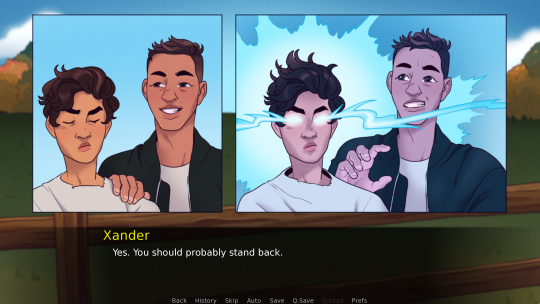
WHO WE ARE NOW (SPINCUT)
Itch.io Tagline: "A queer, post-apocalyptic visual novel about love at the end of the world.” Genre(s): Romance; slice of life; science fiction. Release Date: December 12th, 2017 (Xander’s Story); June 18th, 2018 (Jesse’s Story); TBA (Ray’s Story & Nathan’s Story). Content Warnings: Multiple explicit sex scenes; discussion of traumatic violence.
Who We Are Now, a visual novel following protagonist Wes as he offers comfort to the isolated fellow residents of a post-apocalyptic town named Home under the advice of town leader Mohra. The backdrop for Who We Are Now is distinctly science fiction, but the worldbuilding elements are interestingly vague enough that the characters only refer to the apocalypse more in terms of how it impacted their lives, rather than concrete details about exactly which places were destroyed on what dates and how. That’s personally something I prefer for character-focused pieces like this, and an interesting contrast to the hyper-detailed way AAA studios approach the apocalypse — it works in Who We Are Now, especially in the instances where the characters react differently to the circumstances of their situation or share different information, because it’s what they’ve retained.
Although Who We Are Now is short and largely still in “preorder”, according to its Itch.io page, both of the two relatively complete Stories — starring romanceable characters Xander and Jesse, respectively — offer distinct enough stories with memorable characters that I feel comfortable saying their two companion pending routes (Ray and Nathan) will all be well worth the price and the wait. Spincut’s script treats the two love interests’ struggles with society and their respective traumas carefully, never really offering an answer or a single moment that stood out to me as being a demand for them to just “get over it”. Both Jesse and Xander bristle, especially in the later half, and neither Xander’s struggle to control his mysterious electric powers nor Jesse’s slow progress fitting in as part of the society in Home go seamlessly. Even Wes’s personality feels realistically flawed; as a character who’s lived for years on his own, there’s moments in the script where his self-reliance and avoidance gets in the way of honest and open communication.
As a relationship-focused story with a heavy emphasis on character development, Who We Are Now’s writing delivers some solid growth and reasonable conflicts in a minimal amount of time, especially in Xander’s Story! Without going into too many spoilers, his convictions about the “bad guys” outside of the community of Home and his struggles with self-worth throughout the story build up to a believable, sympathetic end — his Story raises some interesting questions about violence in a post-apocalyptic world that, combined with how different it felt from Jesse’s perspective, made me all the more excited to see Ray and Nathan’s viewpoints on the apocalypse.
(Also, the sex scenes are 👌.)
The Xander’s Story and Jesse’s Story chapters of Who We Are Now are available now for a total price $15, a price that includes the eventual release of Ray’s Story and Nathan’s Story, both of which currently TBA. For more updates, you can follow developer Spincut on Itch.io or Twitter.

DISASTER LOG C (SOFDELUX STUDIO)
Itch.io Tagline: "It has been raining ceaselessly for 7 days...” Genre(s): Comedy; mild horror. Release Date: October 23rd, 2017. Content Warnings: See Itch.io page.
(This section contains mild, vague spoilers for Disaster Log C’s ending. It’s short and free, you might want to give it a try first!)
When it comes to the four apocalypse stories on this list, they’ve all got (thankfully) relatively different approaches to handling the end of the world, but Disaster Log C’s approach is one of the few visual novels that actually surprised me with its later swerve into a revelation I hadn’t totally expected. (I’m trying to be vague enough as possible, but I seriously didn’t see that plot point coming and can appreciate the worldbuilding that made it easy to accept as a “how did I miss that?” kind of fact once it’s revealed!) Protagonist Mell’s no-nonsense approach perfectly serves the story’s steady pace, punctuated by Mell’s own “Disaster Logs” of the ocean rising up to swallow the island she’s lived on her whole life, and that pace is fed into perfectly with the frantic nature of knife-wielding Issa’s demands about where to go, what to do, and how much alcohol she wants to drink.
There’s a goofiness to Disaster Log C that never undercuts the story’s more serious moments — Mell’s struggle with the end of the world she’s always known and Issa’s own relative detachment from that world as it exists are both given more than enough space in the text, and the story never holds their growth back for the sake of slapstick. But there’s plenty of slapstick and a lot of absolutely hilarious moments, served equally well by both script and story, that are well-placed enough that it becomes clearer and clearer in hindsight exactly when Mell and Issa became as close as they can be by the story’s end. Their dynamic is a delight and well worth reading for, whether it’s in the most serious of heart-to-hearts or a scene where they’re arguing with one another about how much food to eat.
But above all else, the thing that really sells me on Disaster Log C — and Sofdelux Studio’s previous dating sim, Mermaid Splash Passion Festival — is how sincere it is. It’s easy for apocalyptic fiction to be smug, or grim, or just plain dark, but Disaster Log C manages to capture the real grief inherent in its premise without ever plunging into hopelessness. The world Issa and Mell inhabit is a beautifully illustrated one filled with plenty of jokes and triumphant fishing CGs, but it’s also a cruel world, and it’s still very much the story of how everything Mell has ever known disappeared in the blink of an eye. That’s a delicate balance to walk, for sure, but it’s a balance Disaster Log C walks seamlessly enough that its wonderfully optimistic True Ending had me in tears.
Disaster Log C is available now for free, in both English and Korean. Both halves of Sofdelux Studio also have individual Itch.io pages (DCS’s here and Nami’s here), or you can follow their shared Itch.io for more Sofdelux Studio projects!

WE KNOW THE DEVIL (PILLOWFIGHT, WORST GIRLS GAMES)
Steam Tagline: "Follow meangirl Neptune, tomboy Jupiter, and shy shy Venus as they get to know each other--but one always gets left out.” Genre(s): Group relationship horror. Release Date: February 15th, 2016. Content Warnings: Religious abuse; blood; character death; implications of sexual harrassment/abuse.
(This section contains spoilers for the plot and endings of We Know The Devil. Sorry! Please play it!)
It would be difficult — if not totally impossible — for me to talk about why I liked We Know The Devil or what it's doing in this group of visual novels without spoiling the ending in one way or another. (I don't think I could even refer to Venus, my hands-down favorite character, in a way that felt natural without dodging around her pronouns like a middle schooler playing volleyball.) For a while, I considered putting this in the creative design category and trying to avoid spoilers anyway! There’s been of fascinating pieces that I’ve loved reading about how We Know The Devil’s unique choice system operates; its “choose two characters out of three” model is smart, well-executed, and offers a lot of character development in both the duo you observe and the one you don’t in every playthrough.
But the piece of this story that I’ve always loved the most has been its ending and the way I feel that it functions as a work of apocalyptic fiction. While the other three entries on this list are all set either at the dawn of the apocalypse or well after the apocalypse has literally “dawned”, We Know The Devil’s apocalypse is more quasi-metaphorical and much more closely linked to its ending. If you read it 100% literally, the “three worst girls since Eve” ascend in all the ways they were never supposed to be and end the world; if you read it strictly metaphorically, they still become more removed from the all-encroaching, endlessly painful social standards that have been forced upon them. And in that case, it’s even more the “end of the world” for their family or the religious authority figures around them to see that self-satisfaction and acceptance instead of the quiet repression and shame, isn’t it?
I can’t deny that a lot of my fondness for this kind of reading is a deeply personal one, but I don’t necessarily think that’s a bad thing. (If anything, I think how many personal reactions there have been to We Know The Devil is a testament — ha! — to the nuanced writing and worldbuilding.) The legacy of religious abuse in the name of Christianity, specifically Irish Catholicism, is something that’s haunted my own family for generations. It’s dictated who got married and who couldn’t get divorced, it’s been the reason some of my friends were born and the reason some others died, and its impact is so irreversable that the guilt even gets passed down into generations that have barely attended a service. So for We Know The Devil’s true ending to take a lot of those religious hallmarks, that guilt from failing to live up to expectations, and then build up to a true ending where the rest of the world is damned for the way it treated Jupiter, Neptune, and Venus — without the true ending’s text ever condemning any of them for being teenagers who are willing to scorch the Earth, metaphorically or literally, and refuse to accept the pain they shouldn’t have to suffer? As a story about the end of three characters’ slice of the world, We Know The Devil one hell of an answer to the Christian idea of a Rapture, and one I prefer a thousand times over.
We Know The Devil is available now on sale for $1.99 (75% off), while you can try We Know The Demo for free on Itch.io; Worst Girls Games can be found on Twitter and Tumblr with more information about their upcoming project, Heaven Will Be Mine!

AS WE KNOW IT (JAIME SCRIBBLES GAMES)
Kickstarter Tagline: "A heavily branching visual novel, featuring love, friendship and life-sim elements in a future destroyed by the sun.” Genre(s): Romance; drama. Release Date: April 25th, 2018 (demo); TBA (final version). Content Warnings: Alcohol and drug use; violence; mature content.
As someone who really enjoyed Pinewood Island, Jaime Scribbles Games’ debut horror visual novel about college students trapped on an island with a murderer, I’ve been looking forward to As We Know It since I first saw initial character designs. The first demo definitely was what I’d been hoping it would be — although visually unfinished in places, given that the Kickstarter was largely to help fund purchase of its art assets like finished backgrounds and side character sprites — and the story about a post-apocalypse society that largely functioned but still ran into unexpected troubles instantly hooked me.
Interested in hearing a little more about protagonist Ashlynn’s dual focus on romance and maintaining a job, I reached out to Jaime with a couple questions to hear what she had to say about her upcoming visual nove.
First, congratulations on your Kickstarter reaching full funding and a bonus goal! I'm sure you've done a lot of this already during the funding period, but how would you pitch As We Know It to someone who'd never heard of it before?
A heavily branching visual novel with romance in a post-apocalyptic setting. Something along those lines.
Yeah, that sounds accurate to me! What's the experience in having run a successfully-funded Kickstarter for a visual novel been like? Are there any weird little details or things that you weren't expecting to have to deal with that have become surprisingly important?
Hm, I didn’t really know what to expect. I can’t say anything too unusual occurred.
Hey, no news is better than bad news, for sure!
Both As We Know It and Pinewood Island have had different mechanics alongside the romance -- in Pinewood Island's case, unpuzzling a brutal series of deaths, and in As We Know It's case, pursuing a career path in a crisis-stricken community -- that seem to be just as central to the storytelling, rather than a backdrop for romance. Can you talk a little bit about striking that balance?
It’s not easy! I have to make sure it makes sense for these characters to want to pursue romance despite whatever else is going on. That usually means making sure things don’t get too intense until more of a relationship is formed. Since romance is such a heavy aspect I hope people don’t question it too much lol
When you're designing characters' personalities or approving their visual depictions, what do you keep in mind? What do you think is the most important thing when it comes to building a lineup of characters to make them all feel distinct from one another?
I think of different personalities, different types of people I want to write, and then I try to make sure their looks are diverse and varied. As I write them their characteristics become more solid.
Were someone else to make a "dream visual novel" for you as a player, what do you think that visual novel would be like? In terms of genre, romance routes, etc?
Oh I’m not sure 🤔 probably a really good mash up of horror and romance with psychological elements and a mature story (no teenager plz) lol
😆 I'd definitely play that, too!
For my last question, what LGBTQ visual novels from other developers or creators are your personal recommendations?
Let’s see, Hustle Cat, Let's Meat Adam are my faves, but there are tons more out there!
Definitely! Thank you for the conversation, Jaime, I'm looking forward to seeing As We Know It's progress over the next couple months!
You can find more information about As We Know It on Kickstarter, try out the free demo on Itch.io and Steam, or keep up with progress on the game’s development blog!
8 notes
·
View notes
Text
Anti-Zuke Lapis
For those who might ask me for a source on Zuke saying that they think PTSD victims having their trauma fixed is basically oppressive. This was the post: “i like the idea of someone with depression/ptsd not having to get "better" to make people comfortable rather they have friends to rely on in the good and the bad. its okay to be happy and its okay to be sad too“ This is bad because as a PTSD victim I don’t need some ignorant person saying that PTSD victims don’t need to get better. All that will do is encourage people to neglect us and not give us treatment. Yes, PTSD is something that needs to be fixed. It’s not like autism WHICH PEOPLE ARE BORN WITH and thus doesn’t need fixing. Zuke is literally comparing trauma to a disorder that is genetically inherited. That right there is all the proof that a non-SU stan needs to realize that Zuke is not fit for writing for a trauma victim character’s story arc. What they’re saying is dangerous to say to trauma victims. In fact they’re pretty much encouraging trauma victims to go down the self harm route. Because having trauma (when it’s readily available) and refusing to get help can fall under self harm. People with Zuke’s mindsets along with the influence they have are scary. It’s akin to telling someone with a bullet in their head to not get surgery. All you need is your family and friends to survive it uwu! And because the person who said it happened to get fame people are treating this as perfect advice. From my own PTSD experience? YES, I want to get better. I hate having PTSD and I hate the symptoms that I have to suffer through that no one else can understand. I hate having to deal with people who refuse to understand the source of it. I hate when people say I can’t possibly have it because I was never in a war zone or because I’m happy go lucky. (Which made Room For Ruby extra insulting since it basically said seemingly happy people can’t possibly be traumatized.) And I ESPECIALLY hate stories further stigmatizing PTSD like Zuke’s. It’s just validating these neurotypical views of PTSD that makes living more difficult for PTSD victims like me. Zuke may have PTSD or depression themselves or whatever. But that still does not excusde encouraging people with PTSD who relate to Lapis on some level to not get better. That[’s dangerous. Scoeity is hardly built for people born with disorders as it is. Society basically throws PTSD and trauma survivors under the bus. Every day we live with PTSD is like a non-stop nightmare. Do not tell us that we don’t need to get better and that all we need is the support of our family and friends. That’s not enough. If you tell us that you are helping ableism. So fuck off with that remark about Lapis, Zuke. Also I didn’t just make up that pos that provided the sourcet. It was saved by someone who praises Zuke’s writing so you know it’s not like it was saved to smear their rep. This is said site link that saved the post: http://rebrn.com/re/lauren-zuke-confirms-lapis-having-depressionptsd-and-is-happy-au-2875935/
#SU critical#SU discourse#anti-zuke lapis#anti-lauren zuke#writing problems#crewniverse problems#anti-ableism#article
29 notes
·
View notes
Text
A Buffy Dialogue - 6:1-8
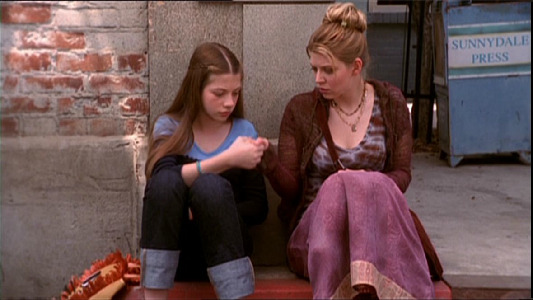
T: It’s time for A Buffy Dialogue, this one on the opening act of Season 6. I’m joined here by Dragon, because there’s just so very much to talk about in these eight episodes. They’re sort of the establishing shots of this season, which is, oddly, the one with the most… start-to-end… season arc in the show. Like, there aren’t really any one-shot episodes so far. They all build the season’s story and emotional beats. So, Dragon, what shall we talk about first?
{*\../*} : Well, since the big arc of the season thus far has been about our characters and their personal motivations for their thoroughly disastrous choices, let’s do a character-by-character breakdown for the readers on where people are and what we think the writers are trying to tell us (and are actually telling us, not always the same thing). Some people are obviously not going to need much telling - the Trio basically speak for themselves, for instance, and Anya’s not got much going on except taking over the Magic Shop. But everyone else has issues! So let’s talk about them.
T: I think I’d like to start with Giles. His bad decisions are both fairly straightforward and the one whose mistakes are most understandable, I think. He’s not operating under any great trauma like Buffy, or mystical whatsit combined with the way the show metaphorized mundane problems like Willow. So… he seems like the onramp here.
{*\../*} : So at the end of “Tabula Rasa” we have Giles on a plane going to England because he’s spent the time since flying back in “Flooded” feeling like a barrier to Buffy’s recovery (probably best expressed in “I Wish I Could Stay”), and the evidence is fairly clearly on his side about the truth of that. He can’t stand watching her suffer at this stage in her relationship, and he’s making classically bad parenting-with-adult-children decisions like writing checks he can’t afford to write on a regular basis to cover bills and having parenting conversations for them instead of refusing and letting them make their own mistakes. That Dawn is being cast symbolically as Buffy’s kid is a bit of a problem given the realistic implications of having an older sister with no job or stable support system ‘raising’ a sibling only a few years younger, which the show actually talks about briefly in Season 5 and then drops completely for 6, and plays into the show’s overall failure to make a stable decision about how realistic it wants Buffy’s dealings with the ‘real’ world post-death to be. But that IS the symbolism here, and Giles is aware he’s acting an enabler to Buffy avoiding her responsibilities as Dawn’s guardian/parent. Given that he can’t make himself stop enabling her, removing himself is a logical choice. Maybe even a better one than staying. But from what you were writing about “Once More With Feeling,” you don’t seem to think so?
T: I hadn’t really thought about whether Giles could afford the check or not… I figured that, after Buffy got him three years of backpay in “Choices,” he probably had some extra cash lying about. Maybe not, though… he apparently spent his whole time from being fired by the Council in Season 3 to his return to England in “Bargaining” maintaining both a house in Sunnydale (and a nice one! But Angel had a mansion there and no money, and Dracula conjured a castle, and Glory kept a mansion or really lovely condo on a nurse’s salary, so Sunnydale’s real estate market apparently operates in some base-cthulu numerical system), so maybe he was in debt that the back pay paid off? Anyway, the show obviously wants us to think of the check as a bad thing for him to have done, and “he can’t actually afford it” is a better explanation for that than most.
{*\../*} : Especially if it’s “he can afford this one, but what about the next one?” which is actually pretty typical with parents and adult children.
T: That’s true. Anyway… to your point about how realistic Buffy’s post-resurrection mundane life is supposed to be… that’s kind of the key problem with the writing here, isn’t it? If we were going to treat it as realistic, the right answer by Giles would be to call the Council, inform them that they’re about to have one Slayer who’s in jail and another who’s homeless and can’t do any Slaying because she’s too busy working a menial job, and get them to start providing a stipend and maybe even paying for health insurance, then having Buffy set up six months of weekly sessions with a therapist who, living in Sunnydale, has almost certainly Seen Some Shit. If we’re going to treat it as metaphorical, shouldn’t there be a monster in the pipes? How can literal pipes break and cause metaphorical life problems? We have to keep this very careful balance of literal and metaphorical issues and barriers to solutions that the show never really gives us for any of what Giles is doing to make sense.
If there is no support network available for Buffy to draw from, she needs to keep the support network she has, because even if Giles’s current behavior is going to do more harm than good in the long run… well, the tire is flat. Yes, the Fix-A-Flat means it’ll cost more to repair later and might need replacing, but when it’s that or starve to death alone in the desert on the now-abandoned Route 66, you use the goddamn Fix-A-Flat.
{*\../*} : Yeah. A lot of this season really fails to cohere because it’s trying to apply the same making-metaphor-of-life-problems rules it uses in high school to young working adult drama, and that doesn’t really work very well at all. But since we just watched Willow wipe everybody’s memories and then Giles get on a plane anyway, I think we can agree that Giles is making a choice that will End Badly for reasons that have a lot to do with his personal relationship with Buffy and maybe less to do with an objective view of the overall situation.
T: Which one could say about Willow and the others in “Bargaining,” too, come to think of it. Oh, look, shiny transition!
{*\../*} : They work better when you don’t point them out, honey.
T: In the spirit of Buffy, I’m going to be impressed with the cleverness of my own writing even if my expressions of being impressed make it less clever.
{*\../*} : Fair play. Yes, the time-bomb we set up in “Bargaining” that finally blows up in “Once More with Feeling” by resurrecting Buffy is absolutely about putting personal emotional stuff above the moral or the practical. We talked about that quite a bit in “Afterlife,” but I think it’s important to pull out two pieces of parallel evidence from the rest of this first third of the season that show nobody has Learned Their Lesson at all. They’re actually not obviously related, because one is played as a gag and one is played as Serious Business complete with a Very Sad Song montage, but I think they are crucially connected: Willow’s stunts with first Tara’s memory and then everyone’s, and the fact that Xander summoned Sweet.
T: They’re both afraid. Willow has more power than Xander by far - I actually agree with Buffy that, by the end of Season 5, Willow has more power than anyone else in the main cast - but neither of them really knows how to prevent loss. I’m not sure if Buffy’s death helped form that fear, but I can pretty much guarantee that it’s on their minds.
{*\../*} : Absolutely. But they have another key commonality. If Buffy is currently the show’s metaphor/punching bag for trying to find your way in a world that’s financially unstable and doesn’t seem to care about your trauma while it’s checking you for credentials and contacts, Xander and Willow are both in the middle of another big life transition: adult relationships. It’s more obvious with Xander, because he and Anya finally come out about being engaged in “All The Way,” but let’s look at Tara and Willow for a minute. They’re living a house together, they’re supporting a household (do either of them have jobs? They seem like they must have jobs of some kind, but that’s never brought up. More realism problems), they’re effectively raising Dawn until Buffy comes back and even then they often seem to be acting as the heads of the household. They’re in a long-term, settled relationship. But they have never once, as far as we can tell, had a real actual fight before. They certainly haven’t learned to fight in a healthy way, which is an absolutely critical skill in a relationship where one partner comes from an abusive background.
So Willow’s on the cusp of having a wonderful adult lesbian family life, but she doesn’t know how to resolve conflict in it and she’s terrified beyond words of losing it. And, as we’ve established with Buffy, she’s got a ton of magical power and isn’t shy about throwing it at problems that scare her (Buffy’s death, Glory, maybe even Joyce’s death before that). Frankly, that she tries to magic her problems with Tara away is almost totally unsurprising in both the realistic and metaphorical senses.
T: True. The precise form of magic she chooses to use is, because Willow has spent most of the show as someone with intense emotional intelligence (Tara has more than her, but Willow spent the time before Tara’s arrival basically second only to Oz in ability to understand people’s needs and feelings) and Tara’s experiences make memory modification even worse than it would normally be, but… well, she has a hammer. Everything from death to life to deities to relationship issues looks like nails. She has a really, really good hammer.
{*\../*} : I think this another of those cases where the writing kinda trips and falls flat trying to get at the metaphor. Because if magic is power, in a different drama setting where power was fame or money Willow would be covering over their relationship problems with a fancy trip or flashy gifts or something of the sort. If magic is lesbian and/or female empowerment, then she'd probably be covering up their fight with really great lesbian sex instead of dealing with the issue. But Willow’s hammer is magic, so that’s where the writers go, and they’re willing to let Willow look either stupid or callous or both for not thinking about the correlation with Glory.
T: She left the Lethe’s bramble in front of the fire. They are obviously willing to make her look both. I don’t think they know how much both they have her looking.
{*\../*} : True facts. But having made that bed, now Willow is crying on the floor in her bathroom while Michelle Branch plays super-sad music and Tara does the I Am Leaving packing montage. Surely she will take this as a chance to sort herself out and learn better conflict management skills, right?
T: Because the next three episodes are called “Coping,” “Adjusting,” and “Living a Healthy Life.” No, wait, the other thing.
{*\../*} : Yeah..... Anyway, my point from earlier is that Xander doing something extremely similar with Sweet - to try to force a happy ending with Anya - is played for comedy because Xander himself is usually played for comedy, but he’s basically doing the same shit as Willow but with less power and more stupid.
T: And by the by, how did I miss that the singer in the Bronze was Michelle Branch? I called out Hinton Battle over and over and missed Michelle Branch. I am shamed. She doesn’t have three Tony Awards, but she does have a Grammy.
And… yeah. Xander, look back at your life. You’ve lived the life needed to answer this question. “In all of history, how many times has summoning a demon worked out well?”
{*\../*} : Do Wolfram & Hart count?
T: Whenever they summon demons, they have to find more evil lawyers willing to risk being devoured by demons to hire. I imagine that’s a pretty employee-friendly job market from the start.
{*\../*} : So speaking of that ending musical montage, Buffy is doing a dead stare over the bar at the Bronze and then she’s locking mouths with Spike behind the stairs. This does not portend good things. I think your coverage of her in “Once More with Feeling” pretty much sums up the lousy place she’s in, but I thought she was starting to look up before the big whammy spell took her memories away. Is she basically reverting to bad coping because of the opposite of the King Ralph thing (speaking of Xander playing other people’s serious stuff for comedy beats)? The spell took her memory of losing heaven away and then gave it back, and she’s having a meltdown instead of laughing?
T: That seems possible. Alternatively, she was just getting better at putting on a happy face. Or her emotional arc over these episodes makes no sense. The writers certainly aren’t telling us. It would, though, make the King Ralph line contribute more than a quick laugh at an outdated cultural reference, and Buffy loves doing that, so let’s go with that.
{*\../*} : I think there will be more to say about Buffy after the upcoming episodes, but I did want to note one thing that I thought was interesting - she’s in a weird liminal space in these eight episodes in a lot of ways, hanging between the dead-and-complete heroine and the newly arrived, very harried twenty-something with serious trauma, but one that stands out to me in particular is her relationship with Dawn.
When we see her with Dawn in “After Life,” Dawn is acting almost as a surrogate mother to her - cleaning her, bandaging her, trying to get through to her. In “Flooded” and “All the Way,” Buffy is very distinctly acting in the maternal role toward Dawn - trying to provide, trying to hammer out the logistical kinks of life, trying to manage Dawn’s social behavior. She winds up defaulting to getting Giles to help in all three areas, but she takes them on as her job to then press him to help her with in the first place. But in “Tabula Rasa,” memories removed, she and Dawn revert very quickly to a much more natural role as sisters and seem much happier about it.
T: I think Dawn might actually be the only member of the cast to be really aware of how badly off Buffy is in “After Life,” and, to a degree, the episodes after it. Well, her and Spike. This is a Problem for Buffy, since Spike is basically toxic relationship structures given human form then having had that human form’s soul ripped out and body filled with even more toxic ideas about what love means, and Dawn is a teenager who needs a ton of taking care of herself (and is also, I’ll note, the victim of an inordinate amount of trauma - trauma that starts with finding out that she doesn’t, technically, exist and moves on to watching her friends suffer torture and injury and risk death to keep her safe, being betrayed by a trusted ally, and watching two parent figures die within months of each other, one of whom literally flings herself off a tower to keep Dawn safe). Neither is in a position to do much to help Buffy, apart from simple physical and emotional first aid from Dawn in “After Life.”
{*\../*} : Something that literally just occurred to me while I was thinking about the last scene of “Tabula Rasa” earlier - Dawn is, of course, being played in that scene as the teenage daughter reacting with anger when her abused mother moves out of the house. That was obvious from the get-go. But if she’s being played that way in that scene, and Willow and Tara are being played very much as her parents, who does that make Buffy (who is also being played as her parent)?
Crazy theory - someone in the Buffy writing staff was casting Buffy in the role of a biological parent rebuilding a relationship with their teenage child who’s living with a married lesbian couple that doesn’t include that parent.
T: Wouldn’t that make Willow her ex? That… actually makes a ton of sense, given the family and relationship structure here.
{*\../*} : Her ex who’s still pathologically attached to her and literally drags her back into the life of the family? Wow. This reading is seriously gaining steam.
T: And she does that while still in a relationship with her new-ish partner. A relationship that is, on the surface, quite healthy. Yeah… we’ve got a winner here.
{*\../*} : Healthy right up until the point when Willow starts becoming (magically) emotionally abusive and engaging in (magical) gaslighting, which her ex (Buffy) is too busy with her own issues to remark on.... Shit.
T: Hence “on the surface.” But yeah… I think we’ve found a model by which everyone’s behavior, other than Willow being stupid with the Lethe’s bramble, actually makes sense. Buffy is back somewhere she doesn’t want to be but loves the people there too much to tell them she wants to go literally anywhere else, Willow is trying to drag Buffy back into her life, Xander is Xander, Dawn is watching her family disintegrate for the umpteenth time in the last six months. Everything fits. Except the Lethe’s bramble in front of the fire. But the only possible model to explain that is “... and using magic makes you occasionally suffer bouts of extreme stupidity.”
… Or Willow wanting to get caught, because it’ll get Tara out of the way in a way that leaves her with less guilt (because Tara would be doing the leaving) and lets her pursue her ex again unimpeded.
It’s not that I don’t buy this model. It’s that I hate it.
{*\../*} : Season 6 - when it’s not incoherent, the model for coherence sucks. Thanks for listening to us in this little catch-up, y’all, and having a good night. Coming up next, “Coping,” “Adjusting,” and “Living a Healthy Life.” Really. We swear.
T: I want to live in a world where those are the next episodes. It sounds like a better world. A world where there is a kitten on my head right now, and it’s mewing and adorable. There is no kitten on my head.
6 notes
·
View notes
Link
When precisely was it has been determined that cartoons are for kids? Even now, when a demonstrate like BoJack Horseman makes on feeling and self-loathing, beings act like it's a gambit.( "Can you believe we're going ADULT themes from this CHILD'S medium? ") Not merely does this move no ability, but animations have been ahead of the arc on some serious issues for decades. Like how ...
5
In Rick And Morty , Nihilism Is A Thinking, Not A Character Flaw
Nihilism has got a real bad rep on the mean streets of pop culture. It's typically boiled down to "Nothing truly interests, so why bother doing good situations? " that are generally evidences in the "villainous nihilist" stereotype. Anton from No Country For Old Men is a violently efficient nihilist, returning lectures about how life and death are as meaningless as a silver flip.
youtube
div >
The nihilist gang in The Big Lebowski give it as a goofy affectation. In True Detective , Rust Cohle's nihilism is a character flaw he heroically overcomes in the finale.
Dour, cranky, cold-hearted ... nihilists are pretty much illustrated as sociopathic versions of Eeyore.
The Cartoon That Does It Better:
Read Next
4 Apps To Utter Your Career A Boost In 2018
One of best available occasions I've ever seen on Tv was the Rick And Morty ( i.e. theme of the virulent Szechuan Sauce Riots of 2017) chapter "Rixty Minutes." Summer, Morty's older sister, discovers that her delivery involved in an accident which, it shows, cleared her parents' lives worse. Morty then confesses in her that he's not the chap she thinks he is, and that he's actually a Morty from another aspect who changed the Morty she knew after his death. He terminates this history by saying, "Don't run. Nothing exists on purpose , nothing belongs anywhere, everybody's going to die. Come watch TV."
youtube
That's where they leave it. There's no joyful, "This was all meant to happen! " revelation afterwards. She has to come to expressions with the fact that nothing was meant to happen ... and that's OK. That is, in fact, the running theme of Rick And Morty . Yes, life had not yet been higher represent and good-for-nothing eventually problems, except the things that matter to you . Rick, has become a superhuman multidimensional supergenius, knows for a fact that nothing was meant to happen. But he formerly killed a jellybean emperor because he supposed he had tried to molest Morty. It's, uh, a bit hard to convey out of context.
Still, all of this is a astonishingly accurate( though extreme) representation of what nihilism really is. Life is without objective represent, determination, or righteousnes, and you're free to do good happenings because you wishes to , not because you think the Universe will reinforce you for it.
4
In Steven Universe , Child Heroes Have To Distribute With Trauma
It's simply the grittiest of campaign movies that actually deal with the psychological consequence in a realistic course. When the subject comes up in more lighthearted fare like Iron Man 3 , the panacea is for Tony to get right back into the action.
div >
youtube
The omission of post-traumatic stress is never more glaring than in kids movies. Stranger Things Season 2 and Harry Potter Movies 2 through 7.5 "shouldve been" has just taken place entirely on therapy lounges. Those children have heard. Some. Shit. But all is well as soon as the bad person is demolished. Knowing your motive was blameless does the PTSD go away! That's the style it drives, right?
The Cartoon That Does It Better:
It absolutely doesn't. Just question Steven Universe .
Steven is the titular courage in a show about himself and his fantastical gem-themed buds protecting the world from a rogue's gallery of gem-themed villains. Steven is a bubbly, quipping war hero who accomplishes bad people the route you'd expect a parody persona to. And then comes the occurrence "Mindful Education."
div >
In it, Steven is helping his acquaintance Connie deal with her regret over inadvertently pulsating someone up. His stellar suggestion? Shove everything deep, deep inside you and claim it doesn't exist.
youtube
As amusing as it would have been to merely resolve the occurrence there, soon Steven is currently facing hallucinations of things he's done in the conflict that he appears frightful about, concepts that no one( includes the gathering) knew he was still dealing with. He's literally left in the fetal statu crying and screaming, "I didn't want to hurt anyone! "
After four seasons of Steven generally saving the day with a punchline and a smile, we learn that he's been internalizing every single grim cache of what he's had to do to save his planet. Recall about how seriously the pop culture scenery get changed if every movie and serial had to do this. Not in surly, "We didn't ask for this war! " kind of acces, but actually making the superstars indicate utter vulnerability in the face of regret. Here's stock exchanges :P TAGEND
div >
Connie: "It's OK! "
Steven: "No, it's not! "
Connie: "But it's OK to think about it! "
Steven: "It feels so bad! "
Connie: "That's OK, very. There was nothing else you could have done."
Steven: "I don't want to feel this way."
Connie: "You have to! You have to be honest about how bad it seems, so you can move on."
youtube
3
Bob's Burgers Portrays Budding Female Sexuality In A Way Normally Reserved For Dudes
TV pictures will spend various episodes devoted to helping a teenage boy out with his abrupt outbreak of boners. Tim Allen's favorite thing in the world is to sit down and explain that shit to whoever happens to have been tricked into playing his son at the time. But girls affecting puberty is frequently be converted into one of two equally inefficient tropes. They either evolve beyond their age and start doing trash like sleeping with schoolteachers( like in a strange number of teenage pictures ), or are interpreted as unattractive punching ball( like Meg on Family Guy , who is detested for plainly prevailing ).
div >
On TV, pubescent girlfriends aren't allowed to be weird in a winsome, relatable nature. They must either have the sex drive of a porno pizza bringing mortal or be an amoeba with glasses.
The Cartoon That Does It Better:
Tina on Bob's Burgers is an anomaly. She's unabashedly curious about sex in a way that's not is expected to be sexy to the public or the men she's very interested in. That's where most TV shows stumble. Because a person is currently in the process of wade through the morass of her own virility, scribes decide that we need to find her seductive as well, or at least cute -- otherwise, she's a punchline.( "Can you suppose if unattactive people wanted to have intercourse ? ") This is Tina :P TAGEND
youtube
div >
youtube
She ogles guys, she writes startling lascivious myth, she honestly seeks the guys she misses. Tina's journey is not read through the "male gaze, " as they say, so her investigate of her changing torso is actually all about her as a human being. That's super rare on Tv, much less in animation.
The poignant circumstance is that a good part of that are able to because Tina was primarily supposed to be a male reputation. The columnists liked the specific characteristics, but thought it was too close to the character of Eugene, so they changed the gender but little else. So basically, the only style you can get Hollywood to depict a woman's coming of age in a odd more honest course is to get them to pretend it's a dude.
div >
2
Captain Planet Was Making On AIDS Hysteria In 1992
Words cannot describe the affection I have for Eddie Murphy. I was fostered on his movies, and his influential stand-up specials Hallucinating and Raw might have single-handedly gotten me through college. But I wince every time I discover the divisions in his specials where he speaks of homosexual beings, specially when he talks about AIDS, which he laughter about with all the subtlety of someone shedding a golf club at a seagull.
And regrettably, he wasn't alone -- back in the working day, when AIDS was just some mystery disease that people associated with homosexuality , no one wanted to be in a room with someone who had it, let alone talk about it in a reflective behavior. Beings with the disease were treated like villains. Ryan White, who contracted it while "hes in" secondary school, was forced to use separate bathrooms and munch his lunch with expendable utensils, which is so horrible that after typing it, I invested a moment staring into space.
div >
The Cartoon That Does It Better:
Somehow, in the middle of all this, the person or persons behind Captain Planet are determined to do an episode about AIDS. In 1992 's "A Formula For Hate, " a high school basketball participate( voiced by Neil Patrick Harris !) gets HIV, and the bad guys get the town to rampage against him. Captain Planet, that unceasingly genu blue-skinned beefcake, gradations in to speak up on the boy's behalf, moves the town directly on the facts about AIDS/ HIV, and persuades them to let him represent basketball again. There's too a PSA at the end on not freaking out on people who have AIDS, in cases where you envisioned the actual occurrence and thought it was mostly about basketball.
youtube
This was a year before Tom Hanks' AIDS theatre Philadelphia , and an epoch in which missionary pastors were calling AIDS a judgment from God and informing panic-struck parishioners about AIDS-infected blood being used as a weapon against Christians. Captain Planet lighted this incident directly to the exceedingly children of the grownups who'd bought into that hysteria. Grownups who, in the chapter, were made to look like rueful assholes led astray by their own blatant ignorance.
1
Sailor Moon Was Way Ahead Of The Curve On LGBTQ Relationships
If you want to squirm your stomach out, start watch any '9 0s sitcom dealing with LGBTQ issues. Even when queer references were presented as people who could hold basic human relationships( like in Will& Grace ), they were countered by sees like Friends , in which males couldn't even touch each other for anxiety of being seen, and I hope you're sitting down for this, gay. If you don't believes me, here's a montage of some of the homophobic moments from Friends . Too, this video is a fucking hour long :P TAGEND
youtube
div >
Not that it was any better in film, where "deviant" sexuality was code for sociopathic amorality( watch: Sharon Stone in Basic Instinct , or Buffalo Bill in Silence Of The Lambs ). This was not that long ago, children!
The Cartoon That Does It Better:
Before Will& Grace and Buffy The Vampire Slayer 's Willow and Tara, there was the beautifully ass-kicking Sailor Moon -- exclusively, the ties between Sailor Uranus and Sailor Neptune( Haruka and Michiru ). Introduced in Season 3, the girls were suave, proficient superheroes who just happened to be in love with one another, and it was shown as perfectly OK in that macrocosm, before it was perfectly OK in our world.
There were gay male affinities very, like Kunzite and Zoisite, though they were villains, because no one is truly escapes the '9 0s unscathed. And while there weren't any actual transgender references, there were the Sailor Starlights, a boy banding that turned out to be women when they be converted into superheroes. In a kid's prove! In 1996!
And it was all managed highly casually. "Oh, you guys aren't really boys? Aight." If it was on Friends , Ross and Chandler would've identified the band and then comically made a self-loathing rain together for a whole season, and then even MORE comically have been forced to move one another. Then they'd ought to have panicked about any blatant homosexual sensations it may have stirred.
Ugh. Fucking Sidekicks .
Archie doesn't really invest all her free time watching animations; she writes about 'em more on BlackGirlNerds.com. Feel free to talk shop with her on Twitter . i>
Man, can you picture if Dallas Buyers Club had been animated ? i > b>
If you cherished this article and crave more content like this, corroborate our website with a tour to our Contribution Page. Please and thank you . i > b>
Read more: http :// www.cracked.com /~ ATAGEND
0 notes
Text
COMPARING VIDEO GAMES AND SURREALISM: CHAMPIONS OF ABSURDISM AND EXPLORES THE HUMAN CONDITION.
I originally wanted to base my essay on the ongoing debate about whether or not video games should be considered fine art worthy of being placed and revered in art galleries. Film critic Roger Ebert strongly opposes the notion that games should be considered art he said “Video games represent a loss of those precious hours we have available to make ourselves more cultured, civilized and empathetic”.

I find this to be totally untrue, I looked at games such as Journey, which depicts a moving and emotional pilgrimage across the desert with themes of sorrow, religion, death and rebirth. I honestly view this game as a modern day painting that could easily resemble a great renaissance painting. The only difference is the level of interactivity. Technology has taken us to the point of being about to directly respond and participate in art. Video games have become a medium that is vastly becoming an intense creative expression and diverse way to spread a message.
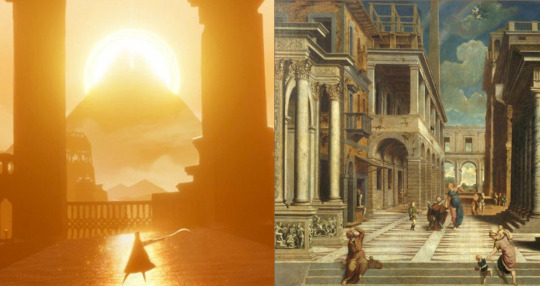
Games developer, Ryan Green, has developed That Dragon, Cancer, a game about how he and his wife are coping with the terminal illness of their youngest son. This game is his medium of expression and his way of coping. It’s as Keith Stuart, the Guardians game editor has said “games are an expressive medium. They are a form of communication… video games are now a language and language is a tool of expression and change”.
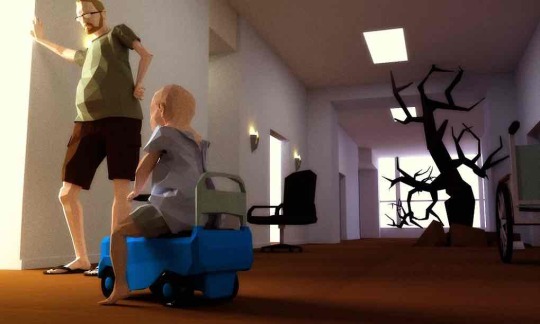
So I originally started this essay with the intention of seeing how technology and art are slowly becoming intertwined by games such as ‘Journey’ and ‘That Dragon, Cancer’. However the more I looked into the subject I was less interested in the definition of art or the technology surrounding the games. I was interested in what the games themselves were depicting. The more I looked for games that were not just aesthetically pleasing but said something deep and powerful I realised a running theme.
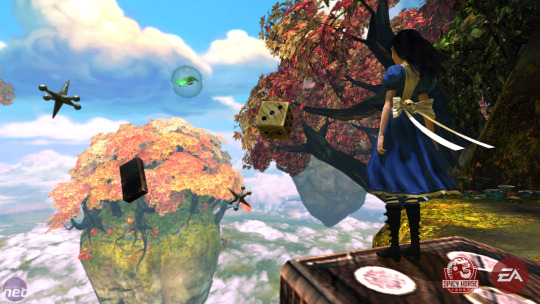
A lot of games that were striving to be something more than a pastime were looking deep into psychology and trying to explain hidden things about the human condition. Take American McGee’s ‘Alice’ series for example. You play as Alice from Victorian London who lost her family in a fire and been forced into prostitution. She has gone mad as a result and falls in and out of Wonderland trying to regain her memories of what really happened. There are stunning landscapes and all the wonderland characters are surreal manifestations of the awful people she knows from reality. The whole game uses wonderland as an allegory of her mind and when it starts to crumble you as Alice have to defend it.

Similar themes are depicted in indie game ‘Fran Bow’ where you play as a little girl trying to fight the demons in her mind. Gaming has become quite a popular medium on which to explore mental health, as you become so invested in the protagonists you almost can experience trauma and psychosis first hand.
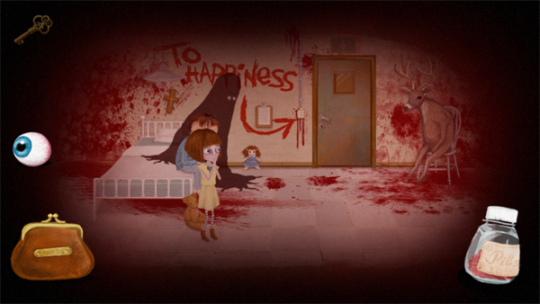
Games more and more are dealing with things like PTSD and schizophrenia such as Special Ops or Hellblade: Senua’s Sacrifice. Bioshock Infinite has been praised for tackling themes like religious and political corruption, racism and xenophobia.
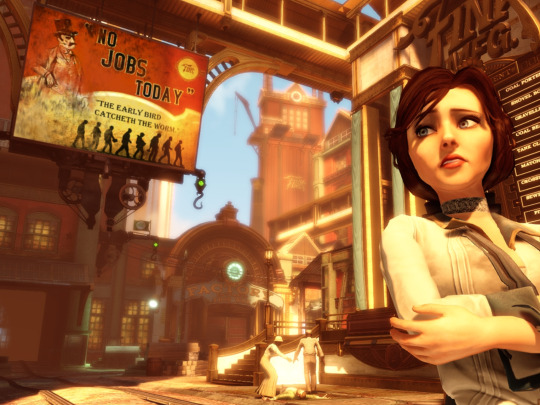
When trying to contextualise these games as works of art I found myself repeatedly going back to the surrealists. They were some of the first to try and depict the human condition outside of strict religious paradigms or with false rationality. They shed restrictive customs and structures to make something new. Which is how I feel video games have shed light on a new way to experience art, it’s shed the restrictive skin of being something as static as a painting or linear as a film. There’s room for a new experimental movement that hasn’t been all that prevalent in post-modernist art for the past few of decades.
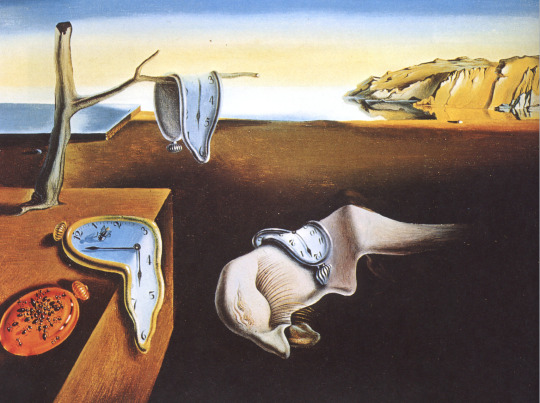
The surrealists strived to ‘Revolutionise the Human Experience’ and create a new way of creating, they created the autonomous style. A technique of writing or drawing straight from your subconscious such as Andre Masson’s “Battle of the Fishes”. He rapidly sketched and applied paint directly from the tube. The image that emerged suggests a savage underwater battle between sharp–toothed fish. Masson, was physically and spiritually wounded during World War I, joined the Surrealist group in 1924. He believed that, if left to chance, pictorial compositions would reveal the sadism of all living creatures. Just like games were Ryan Green’s expression and coping mechanism surrealism and autonomous drawings were Massons.

Sadism and war is a common theme in surrealism due to Surrealism and the Dada movement being a direct political pushback against Western Ideals after the First World War. Artists like Max Ernst, a traumatised soldier created many works trying to deal with his experience of war and such created paints of strange creatures to represent his feelings on the political climate. Such as the Fireside Angel. He was motivated to paint the work after Franco's fascists defeated the Republicans in the Spanish Civil War. Ernst strove to create a painting suggestive of the ensuing chaos he feared was spreading across Europe.
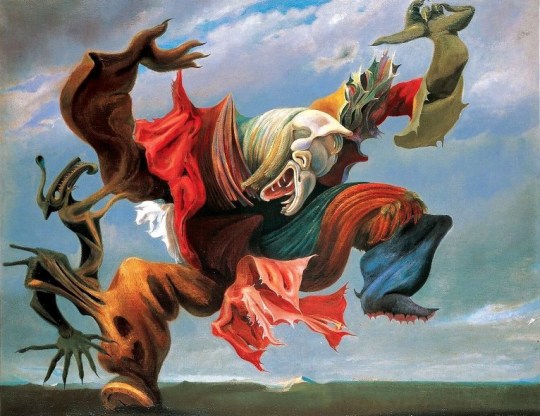
Due to the fighting style of some games, war and terror are also a common theme. Many games explore war, death and the primal urge to battle and survive. While some games take a more literal route like Call of Duty and depict actual battle, others take on a more surreal stance and like Ernst create strange and terrifying creatures to reflect and represent the real world. For example the Executioner card in Alice the Madness returns or in Ninja Theory’s reboot of the classic Devil May Cry series, you fight a demon that has taken over a news station that I think bears a resemblance to a portrait by Salvador Dali.

Surrealism was about making an unnerving illogical sense of the human subconscious. Dali in particular had a lot of work trying to depict dreams often alluding to childhood, sex, fear and death. Which again correspond with many themes in games. Horror games such as Silent Hill use strange desolate landscapes and horrid creatures to reflect the protagonists descent into madness. Silent Hill takes a lot of inspiration I believe from Nietzsche’s quote of “He who fights with monsters should be careful lest he thereby become a monster. And if thou gaze long into an abyss, the abyss will also gaze into thee”. As it follows various characters as they are stuck in the Nightmare town forced to confront their literal demons.
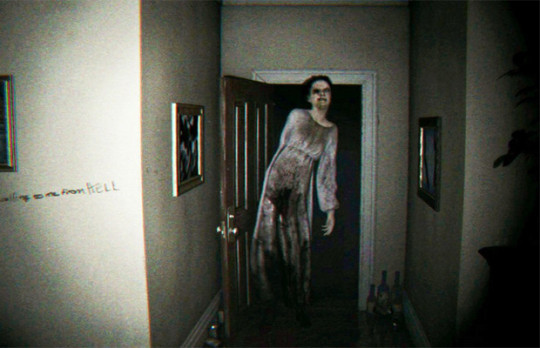
Ernst also created images of strange landscapes such as Europe After the Rain II. Here he paints a vast apocalypse. In the midst of the ruined land, a soldier threatens a female figure with his spear or ruined battle standard. It has been suggested that the figures could be large garden statuary, or perhaps semi-mythical survivors of a futuristic war. You can easily draw parallels between that description and many game narratives today like Fallout or Bioshock. It even looks a little like one of the landscapes
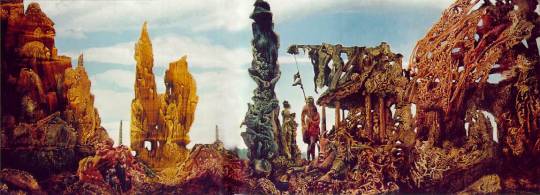

A common critique of surrealism and the gaming industry is that they are both male dominated movements. There are a lot of depictions of women within them, but most of the time they are hypersexualised. Just as surrealism was used to pry open deep psychological traumas and violence, it also showed a primitive need for sex and women. Either depicted in motherly roles such as Magritte’s ‘The Great War’ or simply an object of desire like in Dali’s ‘Bleeding Roses’.

The same can be said for many games where a female characters job is simply to be a helpless love interest only good for a sex scene or two.

Often scantily dressed and there purely for male enjoyment. However just as Frida Kahlo still rose to be a prominent surrealist figure without prior art education, many female characters are being developed giving girls a voice and an outlet not seen as much in old art movements. Portraits are finally being painted of women that are more than just the male gaze.
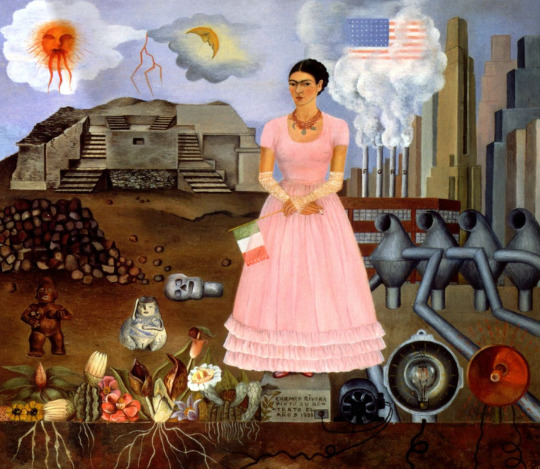
They are giving stories that tell a profound experience to be had in a game to female characters, to be seen through a female lense. Games such as Mirrors Edge, Tomb Raider, Dragon Age and Final Fantasy.
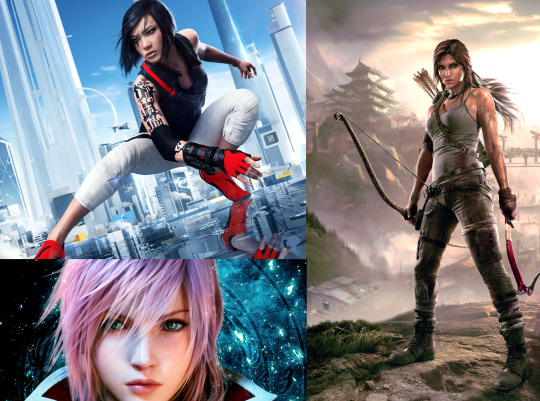
I guess the point of this essay was not to try and depict games as surrealist works despite a lot of the time having insanely surrealist qualities. It was to show a direct parallel being how an art movement has tried to portray human psychology using unconscious expression and absurd character and landscape design with an emerging genre of video game doing almost the exact same thing but with a lot more deliberate finish. But even so Sigmund Freud dismisses surrealism saying it was not an unconscious artistic endeavour but a very conscious liberation of highly structured ego activity. So both games and surrealism are very well thought out methods of experiencing the human condition.
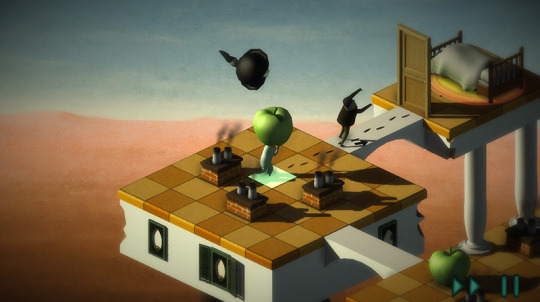
Overall I believe if the surrealists had the technology some very intense games would have appeared dragging the player into a twisted world to experience a vast dreamscape in a theatre of cruelty.
1 note
·
View note